✚ Scams and AI How fraudsters are using artificial intelligence










✚ Across the fence Why retailers see Trading Standards as an ally











✚ Wishful thinking? What Trading Standards wants from the Government

L Y E C R O

DG
What can be done to stop the flood of illegal, unsafe and non-compliant goods entering the UK from overseas?















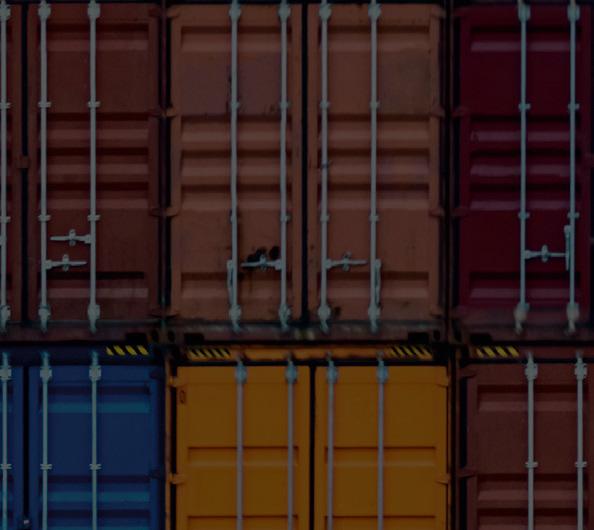


Summer 2023 | www.journaloftradingstandards.co.uk
✚ Electric vehicles The bumps facing consumers on the road to greener driving
CTSI membership fees 2023
NB. Branch fees are collected nationally. Individual invoices will contain this extra amount where applicable. Current fees vary but in brief, for Full Members these are North Eastern £6.00, London £8.00, Midland, South Eastern £11.00, Yorkshire and the Humber, Scottish, South East Midlands, Northern Ireland and Welsh £5.00. Southern, South Western, North West and East Midlands, £zero. Also, a charge of £10.00 will be included for members of the Business Members Group. Any applicable branch/section fee will be taken in the first instalment if paying by Direct Debit
(1) and (2), Please make cheques payable to " Chartered Trading Standards Institute”

(2) For Card, Cheque or Cash payments you must pay by 28 February 2023 to qualify for the discount. A link will be supplied with your renewal to pay your subscription online. For BACS payments, please use the bank details on your invoice, and identify the payment using your six-digit member number.
www.tradingstandards.uk
(3) For new payments by Annual, Quarterly or Monthly Direct Debit the form must be received by 28 February 2023 to receive the direct debit discount. If you paid by this method last year, your discounts will automatically be given. For 2023 you will need to complete the CTSI direct debit mandate, full details and link will be in your renewal notification. The existing TSI mandate will no longer be valid for 2023. For those paying by monthly direct debit, please do not cancel your TSI mandate until January, to ensure December’s payment is processed.
Representative Example: Monthly Direct Debit. 0% APR Representative. Full Membership subscription £126.00, 12 payments of £10.50. Total amount payable £126.00. For further information and finance terms please contact CTSI, 1 Sylvan Court, Sylvan Way, Southfields Business Park, Basildon. SS15 6TH

(4) Students in full time education are FREE for their qualifying term.
Leading the trading standards profession


(Not including branch fees) Annual fees (1) Annual fees (2) Annual fees (3) Standard fees 2023 rates With early payment discount 2023 rates With direct debit discount 2023 rates Full membership £136 £131 £126 Chartered Trading Standards Practitioner (addn. fee) £50 N/A N/A Associate membership £91 £88 £84 Retired membership £45 £44 £42 Affiliate membership £68 £66 £63 Student membership £44 £42
£45
makepaymentsSpreadyourandnothinggreatsavings–extratopay
Untitled-1 1 11/05/2022 11:46:53
POWER OF PARTNERSHIP
As Trading Standards continues to find itself in the ever more uncomfortable position of having to do more with less, the news that £3m has been allocated to dealing with illicit vapes is welcome. It is, however, just a drop in the ocean of threats and challenges that the profession has to deal with every day to keep the public safe and protect legitimate businesses.
One of my own particular interests is ensuring that the food supply chain is robust and secure so that consumers and businesses aren’t exposed to the threat of food fraud. As this issue’s cover story discusses, this is becoming increasingly difficult in the face of depleted enforcement resources and the added pressures of food inflation and post-Brexit import confusion. Making sure people have access to safe, nutritious and accurately labelled food should be a priority for anyone with a stake in consumer protection, and it is ever more apparent that achieving this means collaborative working between Trading Standards, agencies such as the FSA and Defra, the UK Border Force and police. It will also require more partnerships and cooperation with legitimate businesses which, when things go wrong, are the first to find themselves vulnerable to criminals and fraudsters.
Food is not the only area of Trading Standards that can benefit from more partnership working and knowledgesharing though. The Government’s new Fraud Strategy, with its investment in a dedicated Fraud Squad and national reporting centre, will rely on information sharing between various agencies, including Trading Standards.
Likewise the aforementioned problem of illicit, noncompliant and underage vape sales needs more than just money – it needs a conversation about how legislation can be improved to protect the health of the public while continuing to support the value of vapes as an aid in quitting smoking. Over the past few months CTSI has been central to that conversation, and the achievements so far in this area again illustrate the value of joined-up thinking and partnership. As the saying goes, a problem shared is a problem halved – and we all know the scale of the problems Trading Standards currently faces.
Guest Editor: Kerry Auger

Editor: Richard Young
Designer: Sam Millard
Illustrator: Richard Beacham
Consultant: Paul Thomas Evans
Lead Developer: Mika Sadler
Contributors:
Sonya Dallat, Uday Dholakia, Laura Phillips, David Sanders, Adrian Simpson, Giles Speid, David Travers
Writers: Matt Allwright, William Henry, Helen Nugent, Richard Young
Article suggestions and feedback should be sent to:
editor@JournalofTradingStandards.co.uk
The Journal of Trading Standards magazine and website are produced on contract by Fourth Estate Creative Ltd. www.fourthestatecreative.com
connect@fourthestatecreative.com
Printed
© 2023, Chartered Trading Standards Institute. All rights reserved.
Views expressed by the authors are not necessarily the views of CTSI.

www.JournalofTradingStandards.co.uk | 03
in the UK by Manson Group Distributed by Gold Key Media
Published by the Chartered Trading Standards Institute, 1 Sylvan Court, Sylvan Way, Southfields Business Park, Basildon SS15 6TH. www.tradingstandards.uk 01268 582 200
Tendy Lindsay Chair, CTSI
Leader SUMMER 2023 Journal of Trading Standards
“Making sure people have access to safe, nutritious food should be a priority”
Editorial
Kerry Auger
Kerry is Guest Editor of JoTS.
Richard Young
Richard is Editor of JoTS.
Matt Allwright
Matt is a journalist and presenter of the BBC’s Watchdog and Rogue Traders










Chief Executive, CTSI
John has held various roles in commercial, local government and non-profit organisations.















Tendy Lindsay
Chair, CTSI
Tendy sits on the CTSI Council and is Chair of the CTSI Race & Equalities Working Group.

Louise Baxter
Immediate past-Chair, CTSI
Louise is CTSI Lead Officer for Consumer Advice & Education and Head of the NTS Scams Team.






Prof Louise M Hassan
Duncan is Director of Policy and External Affairs at CTSI.
Duncan Stephenson LEGAL
Gough Square Chambers
David Travers KC & Laura Phillips are specialists in consumer and regulatory law at Gough Square Chambers.

CPPD
Mahogany Inclusion Partners
Aggie Mutuma is Chief Executive at Mahogany Inclusion Partners, which helps organisations to create more inclusive cultures.

Chief Inspector, Northern Ireland Trading Standards Service
Damien focuses on scams and doorstep crime.
Trading Standards Manager, Highland Council
David is a CTSI Lead Officer for e-Commerce.
Professor of Consumer Psychology, Bangor Business School
Service Director Profession Relationships, CTSI
Phil has experience across private, public and not-forprofit sectors with a focus on regulatory outcomes.

Team Manager - North West Team (Queens Park & Harrow Road wards)
Manager, Monmouthshire Trading Standards Service
Gareth is Branch Secretary for Wales and Chair of the Welsh Animal Health Panel. Giles is a Trading Standards professional who sits on the Race & Equalities Working Group.



04 | Summer 2023
John Herriman
Phil Owen
Giles Speid Gareth Walters
Damien Doherty
David MacKenzie
CONTRIBUTORS
EDITORIAL BOARD COLUMNS
EDITORS
Louise specialises in understanding consumer protection issues. SUMMER 2023 Journal of Trading Standards
08 | News
Success stories, statistics and recent developments in Trading Standards.
12 | Voices from the Front Line
TSOs from around the country talk about what has been keeping them occupied.
14 | Lead Officers
CTSI's enforcement experts on the activities and challenges in their fields.
17 | Opinion: Matt Allwright
Why the electric vehicle revolution has some way to go to create consumer buy-in.
28 | UK International Consumer Centre
An update on funding for the UK ICC.
29 | Online marketplaces
CTSI is supporting a new APPG inquiry.

32 | Opinion: Duncan Stephenson
So far this year CTSI has achieved tangible results in fighting non-compliant vapes.
36 | Exporting UK regulation
Why UK regulations are envied globally.
40 | Scams and AI
Artificial intelligence could revolutionise many areas of life, including online scams.
42 | COVID fraudster
Why a Southwark TS prosecution sends a message to snake-oil sellers everywhere.
48 | View from the high street
Why Trading Standards is good for business.
50 | CPPD: EDI
Making workplaces more inclusive.
54 | Legal
Advice on ensuring a lasting conviction.
56 | CTSI Conference 2023
Looking ahead to this year's event.
58 | Back page
A history lesson on the UK's consumer law.
Point of impact
What is being done to support those fighting to stem the tide of illegal imports?

Manifesto wishlists
Trading Standards leaders discuss what they want to see in politicians' plans.
Operation Vulcan
We speak to the Officers involved in a major anti-counterfeiting initiative in Manchester.


Current affairs
As electric cars become more mainstream, what are the potential consumer problems?

Colour me bad
Examining the social, cultural and product safety aspects of skin lightening cosmetics.
Yvonne Fovargue MP
The Chair of the APPG on Consumer Protection discusses cost-of-living issues.

| 05 www.JournalofTradingStandards.co.uk NEWS & FEATURES
COVER STORY FEATURE INTERVIEW
18 FEATURE
34 24 30 44 FEATURE
FEATURE
38
SUMMER 2023 Journal of Trading Standards
Contents
REUL SUNSET SCRAPPED
CTSI has welcomed the decision to scrap the sunset clause of the Retained EU Law Bill (REUL). CTSI, along with its Safeguarding Our Standards coalition of organisations and Which?, has campaigned to call for a delay and amendments to REUL. The Institute has cited product safety and food safety as areas of particular concern.
DRAFT DMCC BILL
CTSI has welcomed the draft Digital Markets, Competition and Consumers Bill. CTSI Chief Executive, John Herriman, said: “We welcome the commitment to increase powers to support Trading Standards to hold all businesses to account as we are aware of the consumer detriment which arises from unfair and misleading practices.”
COST-OF-LIVING STATS
The number of people helped by Citizens Advice hit a record high during the first four months of 2023. The charity helped more people in January to April than in the same period of any other year on record - 9,600 people a day on average. People needing crisis support such as food bank referrals or charitable grants increased by 178%.
VEGAN FOOD
CTSI is to publish a policy paper focused on vegan and plant-based food. It will examine the issues arising from the current lack of a legal definition of vegan products, including consumer and business confusion, allergen labelling and misleading marketing claims. In compiling the report CTSI has spoken with TS experts, the FSA and Defra.
£3m vape funding announced
The Department for Health and Social Care (DHSC) has pledged £3m in funding to support Trading Standards in tackling sales of non-compliant vapes in England. CTSI and National Trading Standards (NTS) are now in discussions with DHSC about developing a detailed plan for what can be delivered.

CTSI said it welcomes the funding and is pleased to see measures that support Trading Standards enforcement activities.
CTSI has also welcomed a proposed evidence review into the measures which could effectively prevent children from vaping, and said it would support measures to strengthen laws around the positioning of vapes in shops as well as a review into the marketing and branding of vape products.
Vaping is acknowledged as an important tool for quitting smoking but has also led to significant concerns about the illegal sale of vapes to those under 18, as well as the alarming increase in non-compliant vapes available in shops.
Since the beginning of 2023 CTSI has campaigned to raise awareness about the sale
ENFORCEMENT
of illegal and non-compliant vapes and under age sales. The Institute appointed three new Lead Officers for Vaping – Kate Pike, David Hunt and Marsha Bell – and has worked to bring greater attention to the role of Trading Standards in tackling illicit vapes.
The DHSC’s proposals include increased financial support for Trading Standards to increase enforcement action including test purchasing and product testing. There are also plans to establish a centralised task force to support local Trading Standards work.
The plans also focus on increased intelligence gathering, which will be critical in creating an accurate picture of the scale of the illicit vape problem nationally, and to ensure that enforcement work is targeted effectively.
The DHSC has launched a call for evidence on how to prevent underage vaping, to which CTSI will be consulting with members to coordinate a response. Read more aboutvaping on p32 andvisit CTSI'svaping resource hub for further information: tradingstandards.uk/newspolicy/vaping-resource-hub
Mob criticised for violence during TS operation
Community leaders in Birmingham have condemned the behaviour of a mob who aggressively intimidated Trading Standards Officers and police during an investigation in April.
Birmingham Trading Standards Officers were responding to complaints from
local residents and businesses about anti-social behaviour around the Coventry Road area of the city, including illegal trading and the operation of unauthorised food outlets without hygeine certification.
When they arrived at the scene they were confronted with
abuse, and one police officer was injured by a thrown bottle.
Members of the local Green Lane Mosque criticised the actions of a mob; Chair of Trustees, Mohammed Saeed, appealed to those involved to consider the consequences of their actions.
60 SECONDS 06 | SUMMER 2023 Upfront Journal of Trading Standards
Summer 2023
VAPES
COST-OF-LIVING FOCUS
Trading Standards teams around the country have been working to support hard-hit consumers
Forecourt appearance
Shut out scammers
One lump or two?
The Northern Ireland Trading Standards Service (TSS) found that shortweight bags of coal may be contributing to the costof-living crisis. Officers visited 35 retail premises across Northern Ireland to check the weight of bags of coal. A total of 1,107 bags were checked from various packers and 103 (9.3%) were found to be short weight.

Nottinghamshire County Council Trading Standards has been inspecting petrol pumps to help drivers go the extra mile. Measure inspections are part of routine cost-ofliving checks to ensure that the prices paid for fuel, food and home heating oil are correct. Fewer than 3% of the pumps tested were found to be giving less than stated.

Advice adds up
Officers from North Yorkshire County Council Trading Standards have been helping local people to calculate and compare prices when doing their weekly shop. They held a quiz at a street market which asked shoppers to work out which of several offers represented the best value, with the lucky winner taking home a hamper of grocery.

Unit pricing errors in the spotlight
Research by a Trading Standards Officer has revealed that shoppers may be paying over the odds for certain products due to mistakes, inconsistencies and omissions in unit pricing practices.
Paul Miloseski-Reid, Principal Trading Standards Practitioner at Merton Council, found certain products being sold using different units, making price comparisons more difficult.
For example, differently sized packs of onions available at one supermarket were priced per individual onion or per kilogram.
In another example, nuts being sold as a snack were priced per 100g, whereas elsewhere in the store the same product being sold in the baking category was priced per kg. In some examples, different units were being used by the same retailer for the same product online and in stores, while in others unit prices were either calculated incorrectly or omitted altogether.
Miloseski-Reid said: “There is a need for unit pricing to become more workable, online and offline, because at the moment
Scotland and Police Scotland have held a national campaign to combat the rise in doorstep scams linked to the cost of living crisis. The ‘Shut Out Scammers’ campaign raised awareness of doorstep crime, the mis-selling of energy efficiency measures, and other forms of financial harm to which consumers are susceptible.
Trading Standards
it is completely dysfunctional. It needs to be more useful to consumers and it needs to be fit for purpose. That means improving the size, font and colours of price labels, as well as when and where they appear, and the units that are used.”
Wendy Potts, CTSI Joint Lead Officer for Fair Trading, said: “This is something that has needed a review for a long time and there’s potential for tidying up or modernising the requirements.
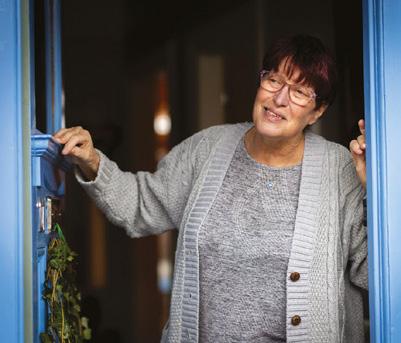

“The whole point of unit pricing is to enable consumers to make comparisons so they can work out what product is the best value. Businesses generally want to do the right thing, but they do want clarity on this. I'm sure they find it as confusing as
Loan sharks circle Research commissioned by Stop Loan Sharks Wales shows that 38% of people in Wales are more likely to need to borrow money this year, with 50% of those borrowing needing funds for everyday living expenses such as food and energy bills. The research found that those aged 18-34 are most susceptible to targeting by illegal money lenders.
enforcement officers do. As Trading Standards Officers, it’s our job to make sure consumers understand what they’re getting for their money, and that prices are visible and easy to understand.”
Sylvia Rook, also CTSI Joint Lead Officer for Fair Trading, said: “At present the legislation is too complex for retailers to understand. There are different units for different product categories, some of which are quite counterintuitive. There are also exemptions for certain retailers, depending on the size of their store.”
The Competition and Markets Authority (CMA) is currently conducting a review of unit pricing rules, to be published later this year.
SUMMER 2023 | 07 Journal of Trading Standards www.JournalofTradingStandards.co.uk
PRICING
ROGUES' CORNER
Trading Standards teams have been taking on crooks who prey on consumer vulnerability
Builder fined in Belfast

A builder and paver who carried out poor quality work has been ordered to pay compensation of £2,750 to his victim following an investigation by the Northern Ireland Trading Standards Service (TSS). Barney Doherty, trading as Drives and Patios, pleaded guilty to failing to carry out work to a professional standard of skill and care and failing to provide documentation, including the consumer’s cancellation rights. Alison Gilchrist of TSS said: “At a time of rising prices and increased cost of living, it’s hugely important for consumers to have confidence in local tradespeople and to expect good quality and professional services. TSS remains committed to investigating those traders that take advantage of consumers and do not comply with the law.”

Fraudulent trader jailed
A trader has been jailed for five years after scamming a number of victims including one elderly homeowner with dementia. After an investigation by Bath & North East Somerset Council Trading Standards, Maurice Cole, trading as HSB Roofing Ltd, pleaded guilty to fraudulent trading. In sentencing the judge took account of telephone messages which included talk of boosting jobs, targeting old people and pushing prices up.
Hefty fine for scammer
A landscape gardener in Hartlepool has been given a suspended prison sentence and fined for taking large deposits from customers for work he failed to complete. Jordan Tierney, trading as Hartlepool Groundworks Services Ltd, took more than £13,000 from 10 victims but did only minimal amounts of work. Hartlepool Borough Council Trading Standards department, which investigated and prosecuted Tierney, said on one occasion he took more than £2,000 in advance but was never seen again by the victim. In March Tierney was sentenced to nine months imprisonment, suspended for 24 months, and ordered to pay £12,825 compensation to the victims. He was also sentenced to undertake 100 hours of unpaid work and ordered to pay £2,695 in investigation costs.
Newham tackles unfair practices
During visits to retailers to assess pricing compliance and restrictive statements earlier this year, Newham Trading Standards found that 53% of businesses displayed non-compliant refund notices, used misleading adverts, or failed to operate in accordance with consumer pricing law or best practice guidance. It was also noted that 8.61% of businesses visited in the London borough did not display prices correctly and 3.97% of businesses did not clearly display reduced price offers.
Signage or statements claiming to restrict a consumer’s
statutory rights to a refund, repair, or replacement were also discovered.
All non-compliant signage or misleading price offers were immediately removed.
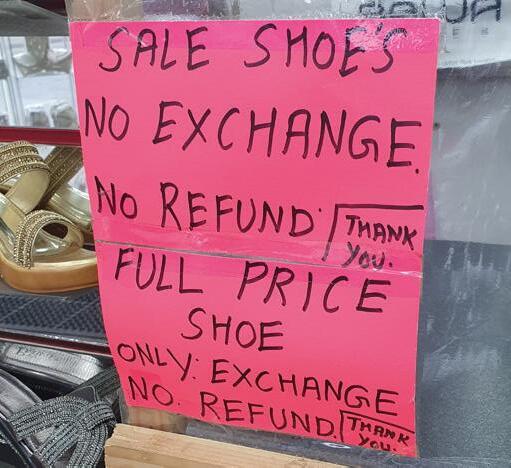
The visits were carried out as part of an ongoing initiative to support local consumers during the cost-of-living crisis. According to the council, the visits “aimed to create a fair trading environment by ensuring that all items are clearly marked with prices”.
Councillor Carleene LeePhakoe, Newham Council Cabinet Member for Crime &
Community Safety, said: “During this cost-of-living crisis, we want all our residents and visitors to be treated in an open, fair, honest, and transparent manner.
“At a time when every penny counts, we must make sure shoppers are properly protected.
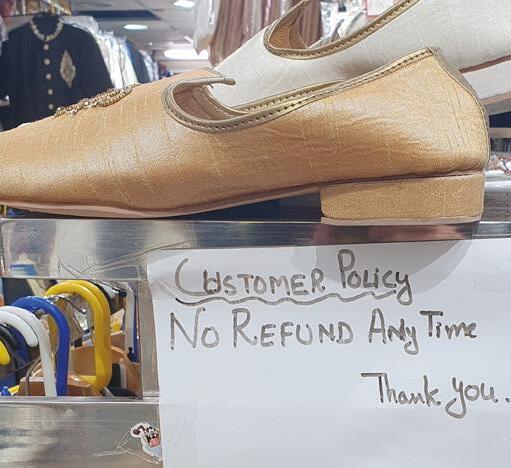
“Newham Trading Standards service is working to support business growth and investment within the borough. Our Trading Standards team are working hard to ensure that they identify any issues of non-compliance within the borough, and will continue to take decisive action where necessary.”
Prison for roofing rogue
A Herefordshire rogue trader has been jailed for 33 months. Naheed Plumridge was found guilty of 14 counts of fraud and one count of fraudulent trading. The prosecution was led by Herefordshire County Council with support from Powys County Council Trading Standards Service, which found that in early 2020, Plumridge carried out overpriced roof works at a property for £2,000, intending to make a gain of £1,245 for himself.
08 | Summer 2023 SUMMER 2023
Journal of Trading Standards
Upfront
RETAIL
Image credit: Newham Council Trading Standards
FACTS & FIGURES
The Government has announced its new Fraud Strategy to tackle economic and consumer harm
40% of crime in the UK falls under the category of fraud
£30m will be invested in ‘a state-of-the-art reporting centre which will be up and running within the year’
(Source: UK Government)
Meat fraud investigation
The Food Standards Agency (FSA) has launched a fraud inquiry following allegations that a food processing company sold foreign pork to UK supermarkets which was labelled as being British.
An investigation by Farmers Weekly found that mislabelled, and possibly even rotten, meat may have been sold by the supplier to supermarkets, hospitals and schools, over a period of at least 20 years.
It is alleged that company employees duped food auditors by moving meat around a processing plant during inspections. Former employees said they had “washed” rotten meat to make it appear fresh.
The illegal food trade in the UK alone is estimated to be worth at least £700m, and there are increasing concerns that criminals are exploiting vulnerabilities in the system.
CTSI Chief Executive, John Herriman, said: “CTSI recently
£7bn
amount that fraud costs the UK economy per year 400 posts will be created at a new National Fraud Squad led by the National Crime Agency
sounded the alarm about the high likelihood of precisely this type of food scandal emerging. Unless enforcement is properly funded and those responsible for committing food fraud are brought to justice, cases like this will occur again and again, undermining trust in British produce and potentially putting consumers at risk.
“It is vital that consumers know what is in the food they buy and where it comes from, and that it is safe to eat. We know all too well from the horse meat scandal how bad things can be when the supply chain breaks down. This investigation by the FSA shows a fundamental flaw in the system; if this is happening with pork, there is a strong chance that other meats and food produce could be subject to this kind of fraud.”
FSA Chief Executive, Emily Miles, said: “We are continuing our criminal investigation into how a meat supplier allegedly provided products labelled as British when they were in fact sourced from other countries.” Read more about supply chain issues in our cover story on p18.
£400m wider investement to be made in tackling economic crime
Fake auto parts scam
An investigation by Nottingham City Council Trading Standards into a fake car parts scam which duped motorists out of more than £200,000 has resulted in prison sentences for two men.
Nasir Abdulla and Sayed Mahmoud set up two companies in 2013 trading as ‘g-customz’ and ‘nf-designz’ which imported thousands of fake Audi, Volkswagen and Mercedes parts from China. The items were advertised on Facebook as genuine parts and sold to unsuspecting consumers. Abdulla and Mahmoud made a substantial amount of money from the scam, netting £150,000 and £60,000 respectively.
Abdulla was given an 18-month prison sentence, suspended for two years, and ordered to complete 200 hours of unpaid work. Mahmoud was handed a nine-month prison sentence, suspended for two years, and ordered to carry out 120 hours’ unpaid work.
KNIFE SALES AWARENESS
Traders in Staffordshire that sell knives have been reminded of their responsibilities in a campaign to reduce knife crime. The 'Ditch the Blade' campaign from 15 to 28 May was co-ordinated by Staffordshire Police with support from Staffordshire County Council Trading Standards, which provided advice and information to local busineses.
RECYCLING SCHEME
Falkirk Council Trading Standards has introduced a scheme to reuse and recycle confiscated items which has won praise in the Scottish Parliament. Counterfeit clothes seized by the service are rebadged and distributed to charity, rubber from fake trainers is reused to make playground equipment, and unsafe electrical items are recycled.
TENANTS STRUGGLING
An estimated 700,000 households missed a housing payment in April, according to Which? Missed housing payments were particularly high among renters, with one in 20 (5.2%) missing a payment. Missed rent payments have stayed high throughout the past year, showing many are struggling to keep a roof over their head.
FRAUD STRATEGY
The Government's new Fraud Strategy includes plans to outlaw ‘SIM farms’ which enable criminals to send scam texts to thousands of people at the same time; working with Ofcom to stop ‘number spoofing’, in which scammers impersonate UK numbers; and banning cold calls on all financial products. (See Facts & Figure, above).
| 09 www.JournalofTradingStandards.co.uk SUMMER 2023 Journal of Trading Standards
60 SECONDS
FOOD AUTOMOTIVE
Isle of Wight cowboy jailed
A rogue trader has been given a three-year jail sentence following a complex investigation by Isle of Wight Trading Standards.
Simon Regan left a trail of devastation and broken promises in his wake when he took thousands of pounds for substandard work on driveways.
In one of the biggest prosecutions ever brought by Isle of Wight Council, the court heard how Regan repeatedly bullied and lied to customers, making countless excuses for poor quality work carried out across three counties.
Regan was sentenced on 23 March to three years in prison and disqualified from acting as a company director for six years.
Warwickshire seizes 1m cigs
Warwickshire County Council Trading Standards has seized more than 1 million illegal cigarettes in raids of shops in the county over the past 18 months.
Officers removed 1,008,660 counterfeit and non-duty cigarettes and almost 300kg of illegal hand rolling tobacco from the market during the period. The illicit products have a combined estimated value of £778,000.
The service has also been clamping down on illicit vapes, seizing 10,100 such devices with a combined value of £120,000.
To make a long-term difference, Officers have been working with landlords of recurring problem shops to get the sellers evicted.
‘Just
£35k’
Enforcement of laws that restrict retailers’ promotion and placement of foods and drinks that are high in fat, salt or sugar (HFSS) will receive funding of less than £35,000 a year across all local authorities in England, according to a report by The Grocer.
In 2021 the Government announced legislation to restrict the promotion of HFSS products by volume price and location, both online and in store in England. The restriction of HFSS products by location was implemented in 2022 and the restriction of HFSS products by volume price will come into force on 1 October 2023.

Already severely depleted local authority Trading Standards departments have been tasked with enforcing the rules, which retailers can be fined upwards of £2,500 for breaking and which can result in criminal prosecutions.
However, CTSI has said that enforcing the HFSS rules is unlikely to be a priority for most local authority Trading Standards services in light of the miniscule funding available. “Trading Standards are incredibly
FRAUD
for HSFF enforcement
stretched right now, having faced a halving of resources over the last decade,” CTSI Lead Officer for food David Pickering said. “This means we have to be very clear on what the priorities are across each local authority.
“While these regulations are seen as an important public health measure, it will be for local Trading Standards services to liaise with their public health teams and adopt an approach that is in keeping with the public health priorities in their area.”
The HFSS rules have been criticised as “confusing and complicated” by some in the
Fake vinyl record trader guilty
An online trader who made more than a million pounds selling counterfeit vinyl records has been successfully prosecuted.
Richard Hutter came to the attention of Dorset Trading Standards after a customer complained that they purchased a fake record online. Officers
carried out test purchases of records which a representative of the British Phonographic Industry (BPI) identified as counterfeit.
Hutter denied knowing they were fake but an examination of his phone revealed he had tried to arrange for counterfeit vinyl to be made to pair with record sleeves.
retail industry, with many struggling to bring them into practice. Following the introduction of rules on HSFF product placement last year, some major retailers took several weeks to bring stores fully into compliance, and the introduction of rules on HSFF promotion was delayed due to concerns about food inflation.
The shortage of enforcement funding – roughly the same as the income of a family entitled to Universal Credit, according to The Grocer – makes it likely that many retailers will be unaware of their legal obligations.
Hutter was sentenced to four months imprisonment suspended for two years, 250 hours of unpaid work to be completed within 12 months and an electronically monitored curfew between 8pm and 7am for three months. The sum of £373,589, which Hutter was found to have available, was ordered to be forfeited under the Proceeds of Crime Act.
10 | SUMMER 2023 Upfront Journal of Trading Standards
Summer 2023 FOOD
ROGUE TRADERS
TOBACCO
SCOTSS sets sights on shop price failures
Consumers in Scotland are being left out of pocket to the tune of millions of pounds by retailers who fail to obey pricing rules, an investigation by Scottish local authority Trading Standards services has found.
Officers from 22 local councils encountered a range of issues when they visited supermarkets, convenience stores and small retailers. They found items that were wrongly priced, were not priced at all, or failed to provide unit pricing to help shoppers compare products.
The retail pricing project, coordinated by the Society of Chief Officers of Trading Standards in Scotland (SCOTSS), was set up to examine pricing practices at a time when consumers are under severe pressure due to the cost-ofliving crisis. During 118 visits to supermarket chains and 228 visits to small or medium-sized stores, officers checked 30,000 products for price marking and more than 7,000 for unit pricing. A further 9,000 products were tested at the till for misleading pricing.
The investigation found that in national chains, 4% of goods were not priced at all and 6.5% of products displayed incorrect unit pricing. An additional 3.7% of products were wrongly charged at the checkout, with 71% of these being to the detriment of the consumer.
For medium and smaller stores the situation was worse, with more than 14% not being priced properly, and unit pricing information being wrong or missing from 8.6% of items. Almost 10% of products were incorrectly charged at the checkout, 70% being to the detriment of the consumer.
SCOTSS Chair, David MacKenzie, said: “Transparency in pricing is at the heart of fair trade in goods and is a core
COMMUNITY SERVICE
Trading Standards enforcement and prevention activities safeguarding communities
Underage Botox fails
Kent cigarette haul
More than 85,000 cigarettes were seized as part of the crackdown on criminal gangs distributing illegal tobacco in Kent in April. Police stopped a van in Ashford, recovering 80,000 cigarettes and 400 pouches of hand rolling tobacco. A further 5,040 cigarettes were seized two days later by Kent County Council Trading Standards in a linked operation.
An undercover operation by Milton Keynes City Council Trading Standards revealed businesses offering cosmetic treatments to underage people. The majority of businesses contacted did not complete any age verification checks. It is a criminal offence to administer a Botox or filler treatment for cosmetic purposes to anyone under 18.

Counterfeit tobacco

A man from Oldham has been sentenced for selling counterfeit tobacco in Newport. Haval Amin was given an eight-week custodial sentence, suspended for 24 months, and ordered to complete 200 hours of unpaid work. His company, Timisoara Ltd, was also fined £30,000 following an investigation by Newport Council Trading Standards.

issue for Trading Standards teams across Scotland.
“With the current cost-ofliving crisis, it is even more important that the processes and systems that should be in place are working properly and that consumers pay the correct amount for their shopping.
“This is an excellent example of local authority officers working together to ensure the market is working properly and fairly. Officers are there not only to protect consumers but also to help and support businesses.”
CTSI Chief Executive, John Herriman, said: “The vitally important work being carried out by Scottish Trading Standards in relation to pricing issues could not be more timely. Price transparency is crucial.”
Printer cartridge error
An investigation by North Yorkshire Council Trading Standards has resulted in a £4,000 fine for a business that used misleading advertising to sell repurposed printer cartridges. The investigation was launched following complaints from small business owners who had bought products from Your Printer Cartridge Company Ltd of Scarborough.

Illegal vodka distillery
Officers from HMRC have dismantled an illegal alcohol factory which was producing counterfeit vodka and are investigating the matter with support from Staffordshire Trading Standards. The factory near Lichfield had the capacity to produce up to 150 bottles of vodka per hour, evading an estimated £2.5m in excise duty per year.
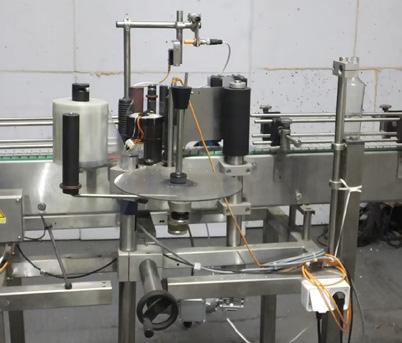
SUMMER 2023 | 11 Journal of Trading Standards
www.JournalofTradingStandards.co.uk
PRICING
Upfront
VOICES FROM THE FRONT LINE
I have also been heavily involved in a variety of other local priority projects in response to the cost-of-living crisis, with the aim of creating a fairer trading environment for all businesses and preventing consumer detriment.
Are there any emerging issues?
and education, and support the reduction of the administrative burden on businesses within our jurisdiction. However, there needs to be a delicate balance to ensure that consumer protection remains at the forefront of Trading Standards’ continuing efforts.
Trading Standards teams across the country face multiple challenges, including counterfeit products, e-bike fires, rogue builders and illegal dog breeding
What has been your main area of focus over the past six months?
Most of my time has been focused on project funding, strategic development, collaborative working, best practice, advice intervention and disruptive enforcement activity.

I also recently embarked on the Regulatory Leaders programme which is facilitated by CTSI.
I have been instrumental in helping Newham Trading Standards seize and remove more than £310,000 worth of counterfeit, illicit, and non-compliant products, seeking to disrupt criminal activity within the borough and promote legitimate trade. This has been driven by partnership work and supported by funding as part of Operation CeCe.
There has been a rise in new businesses registered at virtual offices within the borough. Newham estimates that approximately 16,799 businesses fall within this category. There have also been increases in e-commerce, civil and criminal breaches.
There are significant concerns surrounding a spike in fires in residential dwellings and houses of multiple occupancy within the borough – four since January. There is a direct causal link between the fires and the charging of e-bikes and e-scooters, which are used as a mode of transport by delivery drivers. This is a frightening prospect and I will work hard with the team to eliminate any loss of life and minimise the risk of injury. I will be working to complete an awareness campaign to address this issue.
What are the obstacles to tackling these issues?
Of course, we all wish there were more hours in the day to tackle all of the above-mentioned issues. As a service however, we will continue to provide business advice
There continues to be a significant problem of staffing resources, which has directly affected our ability to tackle the rapidly evolving issues that Trading Standards faces. Incoming legislation needs to be future-proofed to provide the necessary enforcement tools and regulatory penalties to tackle changes in general consumer protection, both physically and via online consumer portals.
There have been continued cuts to regulatory services, coupled with an ageing profession, which has further exacerbated the issue, effectively leading to a steady decline in qualified Trading Standards Officers. Unfortunately, Newham Council has not been immune to the swathe of cuts, and has had to make difficult decisions, resulting in £19m worth of efficiency savings.
A review by central Government to reconsider its position regarding the reduction in local authority funding is essential. Local authority Trading Standards services must continue to innovate, think outside the box, and source internal/external funding to support their work.
SYLVIA ROOK LEAD TRADING STANDARDS OFFICER, WARWICKSHIRE COUNTY COUNCIL

What has been your main area of focus over the past six months?
Most of my time has been spent on two major fraud investigations, which are very labour-intensive. One, in relation to a rogue builder, has already been in court on a number of occasions, but the trial is not scheduled until October 2023, which is not ideal since I know that he could still be out there ripping off elderly consumers.
Since his last court appearance the individual has reoffended, so further charges have been laid and bail conditions introduced, but it would be good if the court process were more efficient.
Are there any emerging issues?
As is the case with a lot of authorities, Warwickshire has been doing a lot of work in relation to illicit tobacco and cigarettes, and also illegal vapes. The methods used by traders to hide the
12 | SUMMER 2023
Journal of Trading Standards
VINCENT SEARLE TRADING STANDARDS OFFICER, NEWHAM COUNCIL
Summer 2023
“There is a direct causal link between fires and charging of e-bikes and e-scooters”
illicit tobacco are becoming more sophisticated (using equipment such as hydraulic lifts) as there is so much money to be made in this area, so this is an ongoing battle between the criminals and the enforcers.
The world of vapes is a complex one, but it is important that the requirements of the law are followed, both in relation to the size of the tanks and the fact that they should never be sold to children.
TIM KEOHANE SENIOR TRADING STANDARDS OFFICER, CAERPHILLY COUNTY BOROUGH COUNCIL









What has been your main area of focus over the past six months?


The last six months have very much been about concentrating on returning to ‘normality’ post-pandemic. This has meant kick-starting things that went by the wayside over the past two or three years.
There has been a rise in illegal dog breeding, with a proliferation of people looking to make huge profits without complying with the rules and often disregarding welfare considerations of the animals they exploit.
Underage sales of vapes are also a concern; the use of vapes is endemic in our schools. Sadly Trading Standards’ concerns have been ignored in the past and it’s now a big problem.
What are the obstacles to tackling these issues?
Any investigation carried out by Trading Standards is extremely time-consuming, and often requires Officers to work out of hours, as criminals do not just break the law between 9am and 5pm! I think the public do not always appreciate the amount of work done behind the scenes by Trading Standards to keep them safe and to protect their hardearned money, and businesses may not realise that we are protecting them from the unfair activities of competitors who may not be complying with the law. I am sure I will not be the only Officer saying that better funding would allow us better to enforce all the new legislation which seems to head in our direction and to be able to do more to protect the public.
That has included reintroducing a programme of under-age sales test purchasing, engaging with scam victims and getting back to some form of consumer education in partnership with local charities and community organisations.
We have also been getting back to dealing with more indepth criminality and playing catch-up with our programmed food standards work.
Are there any emerging issues?
In the area of doorstep crime, we have seen a move away from the criminal gangs ripping off vulnerable consumers towards more locally based, established businesses taking on jobs that are too complex for them; this ends up mirroring the offences committed by the itinerant rogue traders.
Illegal tobacco and misdescribed/dangerous vehicles are as prevalent as ever.
What are the obstacles to tackling these issues?
As ever the main challenge is resources. In Caerphilly, Public Protection (including our colleagues in Environmental Health and Licensing) did particularly well following our response to COVID-19 and were allocated increased resources. However, in Trading Standards we have now returned to the numbers we had back in 2010.
We’re now, like many other services, facing cuts. We could double our staff and still struggle. We currently have four students studying for the Trading Standards Qualification, which in itself is a huge drain on our resources both financially and in terms of devoting time to mentoring them.
What has been your main area of focus over the past six months? Orkney Trading Standards recently participated in national projects covering diverse subjects including fireworks, vapes and self-storage. As a small authority what we can sample is very limited, so working with other Scottish authorities makes the overall results more meaningful and we can compare our outcomes against the national profile.
Are there any emerging issues? Scams are relentless but we are lucky in Orkney that there is a close-knit community and we administer a very active Orkney Scam Action Group. We have been busy in recent months delivering roadshows and dropins on our inner and outer islands and plan to run similar events on the internal and external ferry routes this spring and summer.
What are the obstacles to tackling these issues?
Time and resources are the biggest obstacles but at least delivering this over spring and summer should ensure no ferry cancellations for storm force winds that regularly occur in the winter.
SUMMER 2023 | 13 Journal of Trading Standards www.JournalofTradingStandards.co.uk
GARY FOUBISTER TRADING STANDARDS MANAGER, ORKNEY ISLANDS COUNCIL
“Any investigation often requires Officers to work out of hours... criminals do not just break the law between 9am and 5pm!”
“We’re now, like many other services, facing cuts. We could double our staff and still struggle”
Reporting in
Explosives & Petroleum
Activities: I had a meeting with a representative of the Scottish Government about the implementation of the Fireworks and Pyrotechnic Articles (Scotland) Act 2022, which creates a system requiring members of the public in Scotland to have a licence to buy, possess or use certain fireworks. The Bill also specifies that certain fireworks can only be supplied to, and used by, members of the public at certain times.
Challenges: Following the introduction of the above, there are no imminent changes to legislation.
Fair Trading & Pricing
Activities: We sit on the ASA Pricing in Advertising Expert Group which examines pricing issues, and we have had the opportunity to comment on proposals relating to a possible review of unit pricing.
Challenges: As the costof-living crisis continues, the risk of misleading or unclear pricing is high. Very few businesses comply fully with the requirements of the Price Marking Order, and Which? along with others are making representations that the legislation should be clarified.
CTSI's Lead Officers produce reports every six months on their area of specialism, looking at current and upcoming threats and challenges, as well as recent activities and initiatives with which they have been involved
Holiday & Travel Law
Activities: I have had major involvement, including virtual meetings, with the Department for Business and Trade highlighting our enforcement problems with the Package Travel and Linked Travel Arrangements Regs 2018.
Challenges: There are major issues with consumers being given false information by airlines and holiday organisers at airports. There are also considerable problems with how easy it is for scammers to ‘sell’ fraudulent travel services online, particularly through social media.
Intellectual Property
Activities: I am working with CTSI on the introduction of an IP Competency Certificate to be included in CTSI Qualifications Framework.
Challenges: There is frequent unauthorised use of IP among vaping products, with lookalike trademarks being used to make them more attractive to young people. The IPCG Working Group on Storage & Destruction of Counterfeit Goods –many of which are sold online – is examining issues around the storage of counterfeit goods as evidence and the associated costs.
Food & Nutrition
Activities: We have attended the National Food Standards and Information focus group meetings, and liaised with DHSC, Defra and the FSA about various issues, including the bread and flour regulations consultation, infant formula issues and HFSS regulations.
Challenges: The cost-ofliving crisis has led to an increase in food banks and community fridges, which increases our work in providing advice on labelling information. ‘Greenwashing’ results in various misleading claims about carbon levels of food and sustainability.
Animal Health & Welfare
Activities: We are lobbying for changes to the Animal Welfare Act 2006 via the Kept Animals Bill. There is a lot of interest in the Bill and a desire to see it pass into law. We have also met with DEFRA regarding the secondary legislation for penalty notices following the Animals (Penalty Notices) Act 2022.
Challenges: There are ongoing issues relating to the cost-of-living crisis. Cheaper imports may mean products do not meet the standards expected, which may compromise disease control provisions.
Age-Restricted Sales
Activities: I’m pleased to say that all within CTSI are now concerned regarding the way vapes are marketed but there is a long way to go in changing the way they are viewed and sold as 'lifestyle' products.
Challenges: Vapes are the key focus of the age-restricted sales portfolio. CTSI has been actively involved in pushing for clearer, better legislation on the subject. The Online Safety Bill, which will hopefully address many of the issues with online sales of age-restricted products, is currently at the Committee Stage in the House of Lords.
eCrime
Activities: We have been involved with the APPG on Consumer Protection National Inquiry into Online Marketplaces and Supply Chains, and continue to facilitate on the Electronic Crime Group on the Knowledge Hub.
Challenges: The primary priority within my portfolio is to continue to monitor the progress of the Online Safety Bill as it passes through the House of Lords. Having been criticised by many commentators, it will be interesting to watch the Bill as it passes through the House and whether or not it remains unscathed.
eCommerce Activities: I have liaised with the Department for Business and Trade on the review of the Consumer Protection from Unfair Trading Regulations 2008 and contributed to CTSI's response to the Retained EU Law Bill.
Challenges: The cost-ofliving crisis increases the importance of basic consumer protections such as accuracy of price indications and comparisons online. There are two main areas of legislation where the UK is falling behind: obligations of online marketplaces and fulfilment houses; and cross-border enforcement.
Doorstep Crime
Activities: In addition to fielding frequent media enquiries, we work with the NTS Doorstep Crime Group and EETSA Doorstep Crime Group.
Challenges: Trader matching and approved trader websites are being used by doorstep criminals, as are money launderers to avoid detection.
Criminals are exploiting the cost-of-living crisis and the consumer vulnerability that stems from it. Rogue elements in the renewable energy market, in particular the solar industry, are exploiting vulnerabilities around the net zero agenda.
14 | SUMMER 2023
Journal of Trading Standards Summer 2023
Energy
Activities: Among other activities, I have produced CTSI's response to a call for evidence consultation from CMA on green energy and insulation.
Challenges: The costof-living crisis creates new opportunities for consumer vulnerability. At some stage, competition may return to the domestic energy sector so switching suppliers will become important again. Consumer vulnerability relating to the net zero agenda is an ongoing issue, and there is a need to monitor misleading claims about certain home energy technologies.
Education & Training
Activities: Recent work has included attending Qualification & Governance Working Group meetings, commenting on qualifications review recommendations and CPCF Regulations. I have also given advice to several Local Authorities regarding Officers with older qualifications wishing to transition into the CPCF.
Challenges: There is an increasing amount of feedback indicating a lack of training support from employers. Whilst some are excellent at providing this, others give little input to their students.
Consumer Advice & Education
Activities: I have delivered advice on scams and general consumer education, pushing for consistent messaging and one voice. ConsumerFriend.org.uk promotes inclusive services and consumer advice.
Challenges: The costof-living crisis is creating consumer vulnerability, which is linked to wider issues of health and wellbeing. The net zero agenda is a key issue, as it can cause marketplace vulnerability. Clear consumer advice and guidance on how to access sustainable goods and services should be promoted.
Hallmarking
Activities: I have responded to guidance and advice requests from the jewellery trade.
Challenges: Hallmarking is not universal throughout Europe. Whilst there are mutual recognitions operating in parts of Europe, some countries – France, for example –are not part of them. The legislation is out of date and preserves centuries-old practices that do not encourage modernisation. The industry is trying to improve standards on reducing allergens and toxicity through reduced levels of nickel and heavy metals.
Civil Law
Activities: I do not sit on any committees at present but act as a consumer representative on many issues. I am greatly concerned that consumers may lose protections they take for granted.
Challenges: The Retained EU Law Bill is the major threat facing Trading Standards. It has the potential to erode almost all consumer protection law. The cost-of-living crisis highlights that we live in an increasingly unfair society; without a fundamental change in direction and consumer focused-policies, debt will dominate (see p58).
Consumer & Product Safety
Activities: Among other duties, I chair the RoSPA national home safety committee. Following reports of fatalities concerning baby baths, blind cords and baby slings, we are looking at how to improve consumer education and standards.
Challenges: The Retained EU Law Bill creates a need to ensure that safety legislation and standards are maintained at the current level; the OPSS Product Safety Review is yet to be published and could have a significant impact. There is also an urgent need for an injury database.
Legal Metrology
Activities: Recent work has included advising on the Safeguarding our Standards campaign and supporting development of CTSI's metrology policy.
Challenges: Many legal metrology issues relate to the cost-of-living crisis, particularly around home energy. An absence of strategy to monitor online sales and imports of weighing instruments which are put to regulated purpose is a problem. Extension of CE marking permissibility has confused the marketplace and no plan exists for when CEmarked instruments are no longer allowed.
Motor Industry
Activities: Meetings with the NTS Used Car group, the BEIS PA Motor Group, VStag and others.
Challenges: Increased pressure on household budgets is slowing the sale of new cars and boosting the prices of used vehicles, causing market volatility. Retailers are obtaining cars from sources they do not usually use, leading to an increase in quality issues. On net zero, consumers are hesitant to fully commit to electric vehicles whilst reliable recharging points are not easily accessible and functioning (see p34).
Property & Lettings
Activities: We have delivered training on enforcement; advised Money Saving Expert on Energy Performance Certificates; met with DLUHC about oversight of accreditation schemes; and met with DBT about gaps in Energy Efficiency Regulations.
Challenges: The Government is concerned about the lack of housing stock and won’t change legislation to allow non-payment of monetary penalties to become offences. This means enforcement is not as effective as it could be and perpetuates problems in the private rented sector.
Tobacco Activities: Among other work, I continue to coordinate projects on behalf of the Department of Health and Social Care (DHSC) and the Medicines and Healthcare products Regulatory Agency (MHRA) around the sale of nicotine inhaling products to young people.
Challenges: Illicit cigarette and tobacco sales, and underage sales of such products, continue to be a major problem, particularly against the backdrop of the cost-ofliving crisis. Non-compliant vapes, including sales to children, are also an ongoing concern.
SUMMER 2023 | 15 Journal of Trading Standards www.JournalofTradingStandards.co.uk
Family fraudsters jailed
A family team of scammers who made more than £2m from setting up misleading websites that tricked people into paying for European Health Insurance Cards (EHICs) have been jailed for a combined 21 years following a National Trading Standards (NTS) investigation.
Brothers Damien Sartip Zadeh (pictured left) and Dale Sartip Zadeh (right)) of Sunderland deceived consumers into needlessly paying for EHICs, which are freely available from the official NHS website.

The investigation was led by the NTS eCrime Team, which is hosted by North Yorkshire Council and City of York Council.
Damien Sartip Zadeh and Dale Sartip Zadeh were jailed
DIVERSITY & INCLUSION
for nine and a half years and eight years respectively after being found guilty of fraudulent trading and laundering the proceeds, between February 2013 and October 2019.
Damien was also convicted of engaging in aggressive commercial practices after threatening consumers who complained to prevent them pursuing refunds. Both brothers have been disqualified from being company directors for 10 years.
Fighting discrimination
CTSI branches across the UK are being encouraged to establish their own Race & Equalities Working Groups in a drive to make the Trading Standards profession more inclusive.
Samuel Abdullahi, Chair of the CTSI London Branch, said: “Setting up a Working Group helps us as a profession to establish exactly who we are, and helps us identify with members. It helps us change things. It also helps us to be more mindful of certain types of businesses and the communities they operate in.
“One of the main benefits is having a safe place where people can talk about their experiences, and have the confidence that whatever issue that they bring up, will be dealt with.”
The first Race & Equalities Working Group was set up by the CTSI London Branch in 2020 in response to the murder of George Floyd in the US and widespread calls for change as part of the Black Lives Matter movement.
Research subsequently carried out by CTSI revealed that more than half (52%) of its
Their parents, Diane Sartip Zadeh (60) and Mahmud Sartip Zadeh (62) were found guilty of money laundering and were sentenced to two years imprisonment, suspended for two years. Both are also required to attend 10 activity rehabilitation days. Mahmud Sartip Zadeh was also ordered to carry out 200 hours of unpaid work and disqualified from being a company director for five years.
NTS test purchasing on the fraudulent websites uncovered a range of misleading features that undermined the NHS service and added no value for consumers.
Upon realising they had been duped into paying for a free service, many victims tried to complain but were met
with hostility and aggression. Requests from victims to cancel or receive a refund – which they were legally entitled to – were refused and often followed up with the threat of legal action if they attempted to claim a chargeback from their bank or credit card company.
HHJ Penny Belcher said Damien Sartip Zadeh used “thoroughly aggressive and nasty threats” when consumers realised they’d been scammed and tried to get refunds.
The NTS case followed repeated warnings to the family to stop the offending. Despite attempts by both the ASA and Sunderland Trading Standards to secure appropriate amendments to the websites to prevent them from misleading consumers, the problems continued. The family were also arrested in 2016 in relation to an investigation by Camden Trading Standards.
members reported hearing racist, homophobic, sexist or other inappropriate language at their place of work. CTSI also found that 25% of those who reported experiences of harassment or discrimination said it involved their sex, while 13% reported age discrimination and 11.4% reported being abused because of their ethnicity.
Discrimination can happen in relation to any of the legally protected characteristics of age, gender reassignment, marital or partnership status, being pregnant or on maternity leave, disability, race, religion, sex or sexual orientation.
“Being a victim of bullying or
discrimination makes the job a lot more difficult, and ultimately it makes people leave and move on somewhere else altogether,” said Abdullahi. “We probably all have a tendency to spend most of our time with people who are like us, but being part of a Working Group I meet people who have different challenges. Being part of a Working Group helps because you have people from different walks of life working together for a common goal.”
For information about setting upyour own Working Group,visit tradingstandards.uk/media/ documents/news--policy/ race-and-equalities/ctsi_re_ regional_group_v2.pdf
16 | Summer 2023 SUMMER 2023 Upfront Journal of Trading Standards
FRAUD
Promising the earth
Reluctance to buy into electric cars is understandable when consumers have learned to be wary of over-optimistic economic and environmental claims
My old Saab estate, Dominic, is looking sad enough to warrant his own country song. His rubber shark fin aerial cover has perished and fallen off. His badges have gone from bright blue to dull chrome and his window seals are mostly moss. I swore a couple of years ago that when his turbo wheezed its last puff I would be going full electric to save the planet and, after the chunky initial outlay, save loads of money.
But there he still is, on the drive, ready to creak into action. And why? Well, because I still need to go to the tip regularly and because, frankly, the shine has come off my Electric Dreams. The cost of buying an electric vehicle is still massive – typically a third more than buying a fossil-fuelled equivalent, the prices of which have also gone through the sunroof. My tiny insurance on the Saab, the cost of occasional bits of remedial work, added to the annual £360 road tax, aren’t a hill of beans compared to £400 a month on an electric car PCP which, at the end of four years, I won’t even own.
The hope of offsetting that huge investment against reduced running costs is looking wafer-thin too. Charging from home is still the cheap option at around 9p a mile, but start travelling distance and you’ll pay the equivalent or more to your spend on Jurassic fluids –and why pay a full year’s wage for a car that makes you nervous to visit a neighbouring county?

‘What about your environmental credentials?’ I hear

you ask. Well, what does it take to create a new vehicle from scratch? How much energy, materials, water and other resources would be used? Dominic Saab would be a block of steel in an afternoon, his Swedish magnificence reduced to cubism when we both know he still has a lot to give. Surely any new car, even an electric one, is going to have to work very hard to make up the distance on a car which has done 120k and is still rolling. My gut tells me that sticking with what you’ve got is always going to be the very greenest choice.
I suppose the main reason that I’m an electrical resistor though, is that a few years ago I bought a diesel car when I was told to, and that turned out to be bad advice, both in terms of cost and the environment. Like any consumer, I don’t need to be shown the wrong path too many times before I end up sticking to what I know: pumps and petrol. If we feel as motorists that the £40k-£50k we spend in good faith won’t be repaid in practicality and reduced costs, nobody should be surprised if we aren’t prepared to make the big switch. ●
(For more on electric vehicles, see p34)
MATT ALLWRIGHT | 17
Like any consumer, I don’t need to be shown the wrong path too many times before I end up sticking to what I know
Matt Allwright
www.JournalofTradingStandards.co.uk
Matt is a journalist and presenter of the BBC’s Watchdog and RogueTraders
18 | Summer 2023
THE VAST MAJORITY OF ILLEGAL AND NON-COMPLIANT GOODS IN THE UK – INCLUDING FOOD, COUNTERFEITS, VAPES AND TOBACCO – ARE MANUFACTURED OVERSEAS AND ENTER THE COUNTRY ILLEGALLY BEFORE FINDING THEIR WAY TO FULFILMENT HOUSES, SHOPS AND PEOPLE’S HOMES. WHAT IS BEING DONE TO SUPPORT THOSE FIGHTING TO STEM THE TIDE?
It’s a perennial problem. Unsafe and illegal products enter the UK and are disseminated around the country to distributors before being sold online or direct to consumers. It is then up to various agencies, including Trading Standards, to clamp down on counterfeiters and fraudsters and to protect the general public.
It will come as no surprise to Trading Standards Officers that this role has become harder and harder over the years. With services cut to the bone while enforcement becomes ever more challenging, preventing fake and dangerous items from being sold on the open market is an uphill battle.
The statistics are staggering – if you can find them. Let’s consider counterfeit goods. It has been some time since the UK produced national data on counterfeiting crimes. The last report was in 2019 when the UK Intellectual Property Office (IPO) and the Organisation for Economic Co-operation and Development (OECD) calculated that annual imports of counterfeit and pirated goods to the UK accounted for 3% of all UK imports.
Meanwhile, in 2016 the fake trade was found to be worth £13.6bn.
The IPO and the OECD also reported that yearly lost sales for UK wholesalers and retailers due to counterfeit and pirated products, smuggled into the UK, was £9.2bn. They said that at least 86,300 jobs were lost due to counterfeiting and piracy in 2016, with a reduction in UK public revenue equal to almost £4bn.
Looking at the most recent EU data, published towards the end of last year, Phil Lewis, Director General of The AntiCounterfeiting Group (ACG), estimates that 30% of goods coming in are potentially dangerous to consumers, with 80% of that figure coming from China and Hong Kong. According to Lewis, sea freight remains the main method of arrival of goods, with 65% of counterfeit articles arriving in shipping containers.
These figures are hard to digest. And that’s before COVID is taken into account. Of course, the pandemic had a big impact on the way that people shop, with internet purchases quickly becoming the norm. Counterfeiters were quick to realise this and changed their operating habits, often
circumventing legitimate platforms to sell their fraudulent goods.
“The pandemic brought really unexpected challenges and opportunities for this kind of criminality,” says Lewis. “It changed the way we shop; new buyers started to trust the internet and the criminals knew that this was happening. They recognised the increase in internet shopping and they adapted to the new opportunities and the new demands for various products. They copied any emblem and any product and, obviously, they cut corners doing it.
“This is international criminality, and we are trying to deal with it at local and national levels. We simply don’t have the resources. We don’t have the institutions to be able to do this. This is really going to get worse, and it will become more difficult to detect.”
Food fraud
There are also worries around illegal food imports. Earlier this year, CTSI said that it shared the concerns of the National Farmers’ Union (NFU) that the UK is at risk of a food scandal as a result of
www.JournalofTradingStandards.co.uk | 19
Journal of Trading Standards
diminished resources for ensuring the safety of the food supply chain. These fears were, in part at least, borne out after it emerged that foreign pork falsely labelled as British appeared to have been sold by leading supermarkets. The case – which also allegedly involved rotten meat being supplied to UK supermarkets – is now part of a food supply chain fraud investigation being conducted by the Food Standards Agency (FSA).
Product safety
Despite the scale of the challenge, there are enforcement success stories. In March, Rochdale Borough Council Trading Standards service announced it had seized millions of pounds worth of fake designer clothing, handbags, shoes, jewellery, perfume and watches over the previous two months. The haul amounted to approximately 60,000 items with a retail value of about £9m.
When it comes to entry points, Trading Standards officials in Kent are at the coalface. Mike Johnson is Imports
Compliance Manager at Kent Trading Standards. His team is responsible for product safety at the various (and numerous) ports of entry to the UK within the county. These include Dover and the Channel Tunnel as well as an inland border facility, fast parcel hubs, and multiple warehouses. Other ports of entry are in the planning stage.
£12bn loss to UK businesses and economy caused by food fraud (FSA)
38% of consumers believe counterfeit food is a problem (NFU)
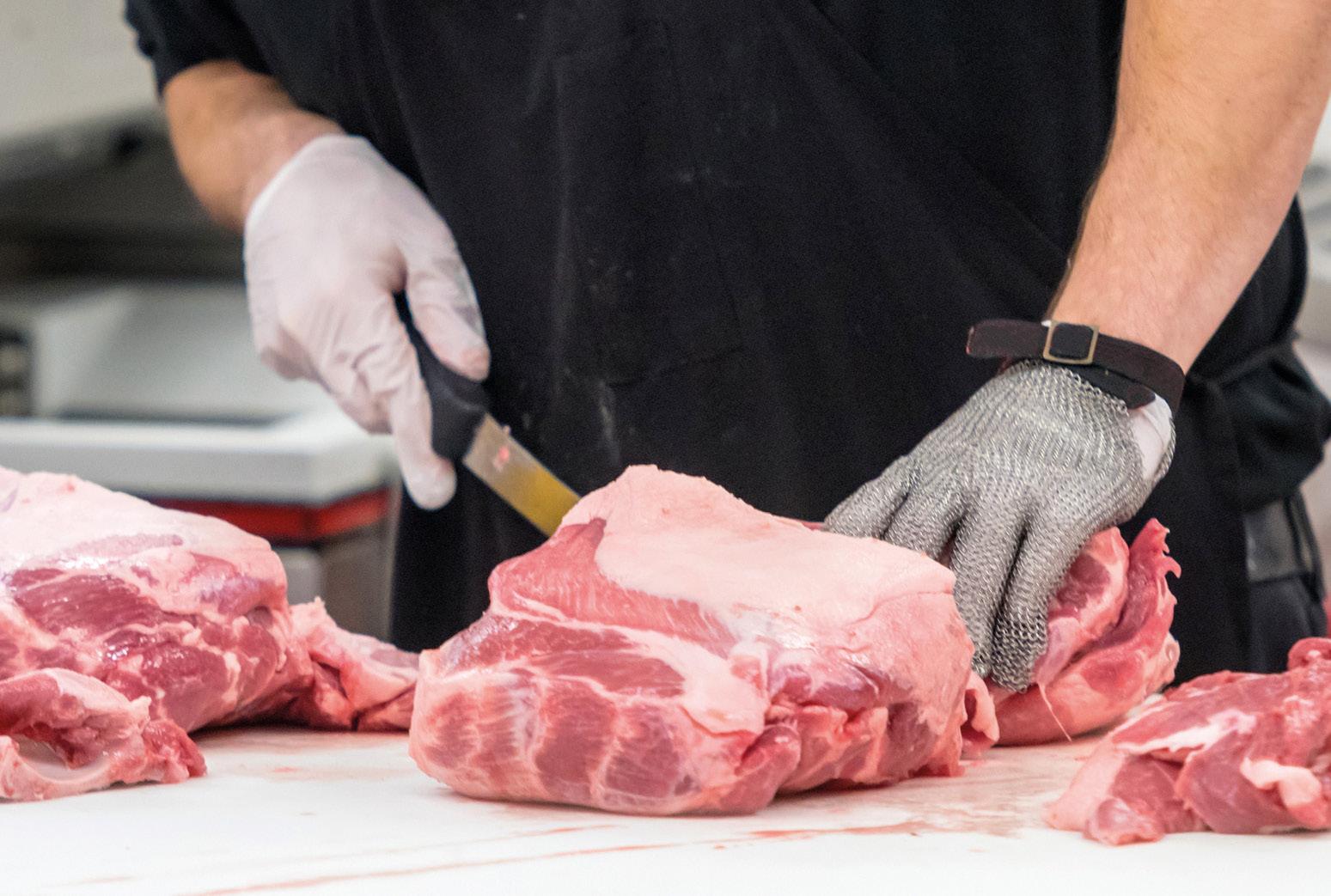
referrals of cases for us to go and have a look at is largely dependent on HMRC in terms of access to the system. So that makes it really complex.”
With noticeable political pressure not to create additional delays at ports, inspection and enforcement work isn’t always easy. And that’s not the only concern, as Johnson explains.
WE HAVE TO RECOGNISE THAT FOR THE SYSTEM TO OPERATE EFFECTIVELY IT NEEDS ALL THE COMPONENTS, NATIONAL, REGIONAL AND LOCAL TO WORK EFFECTIVELY TOGETHER
“This work is very varied and complex,” says Johnson. “There are some other big players in this arena and Trading Standards is a very small player in terms of the border controls. Obviously, the big ones are HMRC and Border Force. Border Force do a lot of work on behalf of HMRC, and the work that the Office for Product Safety and Standards (OPSS) does on firing out
“It is quite clear from our dealings at the moment that, with Brexit and despite the fact that things have been put in place to try and help businesses, it’s a bit more difficult because they keep pushing things back and back. That creates an air of confusion and it’s quite clear from our dealings with shipments from Europe that both UK and European suppliers are not aware of the requirements post-Brexit, particularly with product safety.”
So what kind of things are Johnson’s team having to deal with?
“Very frequently we are seeing confusion in the sense that a lot of importers send shipments straight forward to online platforms and very
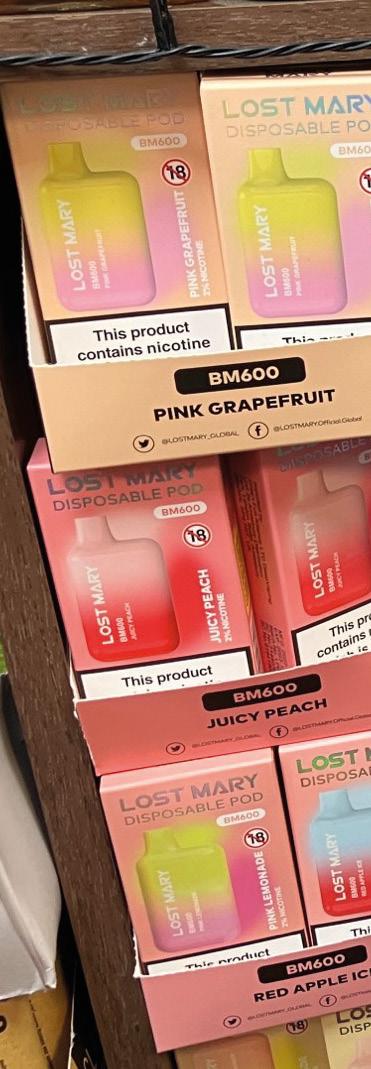
20 | Summer 2023
Cover Story By
Helen Nugent
Left: The FSA is investigating an alleged food fraud case; Right: Illicit vapes seized by Staffordshire Trading Standards
rarely get hands-on with the actual goods. They do not know what they are doing or what they are actually required to do in terms of product safety. Very often they think, ‘Oh, I’ve got an idea and I’ll bring it in’ without even thinking about the implications. And that’s something we see regularly, both in stuff coming in on trucks and via the fast parcels. That’s obviously a big, big issue.”
While there are powers available to Trading Standards teams, they are dealing with a huge range of potential problem products. Johnson says: “We have a lot of issues with handmade stuff which goes on to various online sites. It’s stuff that’s knocked up in the shed or the back yard. For instance, we’ve had baby rockers where the wood is completely rough around the outside, no actual support underneath the cushion, and no fire labelling. Sometimes it’s painted and there’s no indication of what is in the paint. We have a lot of clothing as well, particularly from the Far East, where they adorn their children’s clothing with quite
a lot of what I would term as ‘bling’. This can easily be pulled off and sucked.”
No silver bullet
Meanwhile, Trading Standards services in Scotland face similar challenges.
Christopher Bell is Product Safety Lead Officer at the Society of Chief Officers of Trading Standards in Scotland (SCOTSS). He says that Trading Standards’ market surveillance activities for product safety represent an incredibly complicated landscape in both breadth and depth.
“Undoubtedly the best approach is to prevent unsafe and non-compliant goods entering the market, and this is the aim of Trading Standards teams working at ports throughout the UK,” he says. “This work is invaluable
86,300
UK jobs lost due to counterfeiting and piracy (IPO)
EFFECTIVE MARKET SURVEILLANCE REQUIRES STRATEGY AND RESOURCES AT ALL LEVELS WITHIN THIS SYSTEM TO WORK EFFECTIVELY
in preventing consumer exposure to unsafe goods.


“This, however, is not a silver bullet. Effective market surveillance requires strategy and resources at all levels within this system to work effectively. Only a proportion of goods will be able to be checked on their journey into the country, based on targeting and risk profiling. This is, however, not something which can be done in every case as the volume of trade means that checks introduce delays, and are inherently limited by the capacity available to perform those checks. For every consignment that is not checked, this means that goods move inland and will require further scrutiny at that level.”
According to Bell, risk profiling depends upon effective intelligence sharing but also on identification and development locally. Importers and manufacturers inland require intervention, and that necessitates significant input from Trading Standards Officers at a local level with specialist expertise.
www.JournalofTradingStandards.co.uk | 21
Journal of Trading Standards
Bell says: “This requires a balance to be struck to allow trade to flow and provide an effective level of protection for consumers. This may mean, where capacity is not available, that consignments are passed to local Trading Standards teams inland to consider intervention. Samples may also be taken where goods are released, requiring ongoing engagement at local levels in the event of non-compliance being identified.”
He continues: “Many Trading Standards teams within local authorities will base their product safety strategies upon targeting of importers and manufacturers. This in turn targets those with the greatest level of responsibility, and provides vital intelligence to assist in targeting at ports. The system, however, has been starved of resources and has low resilience at a local level.”
Lewis says that the ACG recognises the persistent problem of resources when it comes to tackling wrongdoers.
“What we need to be thinking about is lessening the burden on Trading
Standards. At the moment, their statutory responsibilities are enormous. So, how are we going to protect the public from more dangerous goods coming in unless we have better intelligence resources?
“At ACG, we try to reduce the burden as much as we can. We carry out knowledgebuilding sessions, we have roadshows so that we can explain how they can more easily identify fakes – the sort of things that fill in the gaps. But you can’t fill a gap when you haven’t got enough resources in the enforcement institutions.”
Business perspective
Other agencies are cognisant of the scale of the task facing Trading Standards regarding unsafe and illegal products entering the country. Adrian Simpson, Retail Products Policy Advisor at the British Retail Consortium (BRC), says that the BRC wants to see more enforcement but accepts that that isn’t always possible.

“Our retailers invest a lot of money into ensuring that only compliant products enter the market. We want to see a level playing field where retailers of all sizes
are held accountable to the same rules, the same regulations, and are enforced in the same way. It is frustrating for us in on the retail side of it to see these noncompliant and unsafe products.
“We’re very aware and we’re very sympathetic towards Trading Standards services who have had their budgets slashed throughout the last 20 years.”
Simpson points out that there are a lot of tools that retailers and businesses can use to try and prevent unsafe and illegal products coming into the country, and asserts that a “huge proportion” of businesses want to do the right thing and put resources into placing safe and compliant products in the market, spending huge sums to ensure that their supply chain is compliant.
Nevertheless, he concedes that “there will always be a proportion of the market who can’t be bothered with this, who don’t think it applies to them, who want to rush products out because it’s the latest fad, because it’s the latest thing that consumers want. We’re all aware of the cost-of-living crisis which means
22 | Summer 2023
Cover Story By Helen Nugent
THE ONLY WAY WE CAN PREVENT THIS HAPPENING IS THROUGH EFFECTIVE, TARGETED AND ROBUST ENFORCEMENT USING A VARIETY OF TOOLS INCLUDING CLOSURE ORDERS AND PROCEEDS OF CRIME INVESTIGATIONS
that consumers are looking for cheaper products, which is then fueling this situation we’re in where unsafe products are entering the supply chain.”
In terms of the unsafe and illegal products entering the UK, how hopeful is Simpson that this problem can be properly tackled? “Without more funding towards frontline Trading Standards, I’m not optimistic that unsafe and illegal products will be prevented from entering the supply chain. Colleagues in Trading Standards at the ports and on the street, as well as colleagues working in intelligence and focusing on product safety and standards are the key to preventing this.
“I think the public attitude towards these products is indifferent at best. I think consumers are driven by value and cost, and many won’t mind buying products cheaper, even if they are unsafe or illegal. The only way we can prevent this happening is through effective, targeted and robust enforcement using a variety of tools including closure orders and proceeds of crime investigation if that’s appropriate.”
£4bn cost to public revenue from fakes and counterfeiting (IPO)


3% of all UK imports are counterfeits (IPO)
Simpson also believes that making businesses aware of their responsibilities is crucial.
“Educating businesses comes through things like Trading Standards and through trade associations. I see a massive part of our role as a trade association as advising businesses,” he says.
The Journal of Trading Standards approached the Government for a comment on the issue. A Department for Business & Trade spokesperson told us: “Our top priority is to keep people safe, which is why goods sold in the UK must meet some of the strictest safety laws in the world.
MANY TRADING STANDARDS TEAMS BASE THEIR PRODUCT SAFETY STRATEGIES UPON TARGETING OF IMPORTERS. THE SYSTEM, HOWEVER, HAS BEEN STARVED OF RESOURCES AND HAS LOW RESILIENCE AT A LOCAL LEVEL

“The UK system for product safety enforcement operates at key points in the supply chain and proactively works with businesses to ensure they
understand their obligations to supply safe goods.
“OPSS co-ordinates an intelligence-led and targeted approach to interventions, and provides grant funding to local authorities at the key points of entry into the UK so that appropriate checks are carried out.”
Looking to the future, there must be more viable solutions that will make the role of Trading Standards more effective? Johnson thinks that this is the case.
“It’s about doing a lot more promotion of product safety to the trade. I think that is really important, particularly for those who are starting up businesses and looking to import. And it’s trying to actually target the right people to get those early messages out.
“Obviously, additional resources are always going to be beneficial. Locally we’ve taken the initiative where we actually go out to our colleagues in Border Force. We’ve done presentations on product safety for them to be our extra set of eyes because there’s a lot more of them than there are of us.” l
www.JournalofTradingStandards.co.uk | 23
Journal of Trading Standards
Left: Counterfeit goods imported to the UK cost legitimate brands billions; Below: A haul of counterfeit cigarettes, tobacco and vapes seized by Warwickshire Trading Standards
WISH LISTS
Michael Bichard Chair, National Trading Standards (NTS)

Has Trading Standards slipped down the political agenda?
Regrettably I think it has, despite the occasional attention recently given to specific issues such as vaping and illicit tobacco. That has made it more difficult to protect resources and, although NTS has managed to maintain its budget I know how difficult it has been at a local level where local authority budgets have been under so much pressure.
Somehow we need to raise awareness, locally and nationally, of the crucial part we play in protecting consumers when they are at their most vulnerable with inflation and the impact of food and energy price rises. Now is the worst time to starve Trading Standards of resources.
Which aspects of legislation and enforcement do you think should be treated as a priority?
Government needs to look again at whether the consumer is adequately protected against online scams and
mis-selling. There is also a need for Government to take a long hard look at the court system, perhaps via a Royal Commission. The current delays mean that it can take four or more years to conclude a case with well-resourced defendants exploiting legal loopholes. The current situation is unacceptable.
Are there any aspects of the Retained EU Law Bill that you are particularly concerned about?
When you rush through changes there is always the danger of unforeseen consequences or missed opportunities.
We have been assured that any changes will not impact on consumer protection regulations, fraud and money laundering but we would like to see some consumer legislation extended and that seems unlikely.
Now is the worst time to starve Trading Standards of resources… it can’t cope with another decade of neglect
What should a new Government do to strengthen Trading Standards?
Include a commitment in manifestos to do more to protect consumers; clearly support the need for sensible regulation to provide a better safety net for citizens; provide sufficient resources to enable Trading Standards to carry out its functions effectively and invest in programmes like apprenticeships to provide the workforce we need. Trading Standards can’t cope with another decade of neglect. l
24 | Summer 2023
We speak to Trading Standards leaders about what they would like to see in next crop of political party manifestoes to strengthen consumer protection and improve legislation
Manifesto wishlists
David Mackenzie Chair, Society of Chief Officers of Trading Standards in Scotland (SCOTSS)

Has Trading Standards slipped down the political agenda?
Compared with 20 or 30 years ago, then definitely yes – both nationally and locally. In those days we had large Trading Standards departments covering big areas and big populations, and some clout within local authorities. It was an era of interventionist local government. Trading Standards was very visible, with high street advice centres, intervention in individual civil cases and annual visits to every business. All that has now pretty much disappeared.
But if we are comparing with five or ten years ago, I’m not sure that things have got any ‘worse’. SCOTSS workforce survey statistics show a steep fall compared with the prior era but something of a ‘bottoming out’ more recently. While further cuts to services are still a real risk, ‘interventionist’ government may be back in fashion to some degree. Trading Standards’ crucial role during COVID has been recognised by government and appreciated by the public. Now we have the cost-ofliving crisis (I prefer ‘cost crisis’ as it acknowledges that businesses are also seriously affected), and we are tackling that and looking to show our relevance and importance through that work.
The Trading Standards experience is very similar to that of most local government services – cuts, more cuts and a struggle for recognition and support. Libraries, Leisure, Grounds, Transport, Roads, Environmental Health, Building Control, even Planning (and many others) have suffered similarly over the years, as have many
central government services. Arguably every local authority service with the exception of Education and Social Work has always struggled for recognition and influence, today and 30 years ago alike. The difference is that back then Trading Standards Managers were given the budget and left to get on with it. Now every penny has to be fought for and the recognition factor is arguably more important than it was.
A final point from the Scottish context is that SCOTSS has much more involvement with Scottish Government than before. There are a variety of reasons for this, not least the role played during COVID, but the news on that front is broadly positive. There are limitations to this of course – most Trading Standards law is reserved to Westminster. But the devolved body of Trading Standards law is growing and of course local authorities are funded by Scottish Government. The creation of Consumer Scotland demonstrates a desire among Scottish politicians (of all parties) for consumer matters to be taken seriously in Scotland.
Which aspects of legislation and enforcement do you think should be treated as a priority?
There are some immediate ones: tackle single-use vapes and the cost crisis. Decent funding of Trading Standards will bring results on the latter through fundamental activities like weights and measures and pricing enforcement. Vapes need new legislation – preferably to ban them and introduce mechanisms to ensure that all vaping is linked to smoking cessation in adults.
In the medium term there is a need to improve the regulation of online trading. For a start, make fulfilment houses liable for imported products for which there is currently no responsible business. There is also a need to update consumer law to recognise the key role of internet intermediaries, in particular online marketplaces and social media sites.
Trading Standards services must be resourced and trained to operate in the future, otherwise online will not be a safe place for consumers or reputable businesses.
The creation of Consumer Scotland demonstrates a desire among Scottish politicians for consumer matters to be taken seriously
Are there any aspects of the Retained EU Law Bill that you are particularly concerned about?
Certain parts of the Bill threaten consumer protection as we know it – I don’t think that is an over-statement. The absolute fundamentals of our established system are under threat, including the CPRs and product safety laws. I am also concerned that even if some of the ‘headline’ legislation is ‘saved’, less-well-known provisions may get lost.
What should a new Government do to strengthen Trading Standards? Nationally, work to ensure that the laws are right, and introduce new laws for vapes and online sales. Locally, fund Trading Standards services – without that there is no Trading Standards at all. l
www.JournalofTradingStandards.co.uk | 25
Journal of Trading Standards
Judith Parry Chair, Trading Standards Wales

Has Trading Standards slipped down the political agenda?
Yes, I think so. Trading Standards has seen more than ten years of austerity, yet new duties to enforce continue to be allocated to us. These are often without any additional funding, or an unrealistic Regulatory Impact Assessment which places a small amount of funds into Local Authorities, but it is not ringfenced to Trading Standards so often it doesn’t reach us.
Trading Standards is not great at promoting itself. This can be challenging in many ways – from attracting people into the profession through to promoting what we do with elected members and politicians. Much of the legislation we enforce goes unseen until an issue arises. One often sees other professions benefiting from additional resource after a cataclysmic event, but that does not seem to happen with Trading Standards. The lack of resources we have to deal with is rarely mentioned in the media.
It seems that when it comes to consumer matters, Government’s answer is to fund national bodies such as OPSS or the FSA with a promise that they will support Trading Standards, but in reality the benefit of such activities is minimal and appears piecemeal. It is disheartening; Trading Standards is a shrinking profession – this can lead to stress and anxiety as we have to make difficult decisions on prioritising our activities when most of us wish we had enough resource to do it all. We have streamlined processes to work smarter; we have developed intelligence-led processes; we have nothing left to cut.
Within Wales we have the additional challenge of devolved matters and increasingly what we deal with does not fit within one bracket. For example, are vapes and illegal tobacco a
safety (Parliament) or public health (Senedd) matter? Trading Standards Wales is currently engaging with Welsh Government on a number of environmental bills, and we have to consider the potential difficulties of businesses who trade across the border and the confusion that could occur if legislation differs to a greater extent.
We
Which aspects of legislation and enforcement do you think should be treated as a priority?
I think most will agree that the environmental agenda is important, and cuts across a lot of Trading Standards legislation as well as bringing new demands. Unfortunately each positive step often has unintended consequences – each time a new grant for consumers is advertised, rogue traders and fraudsters latch onto this.
Vaping is an increasing concern, and whilst the news of £3m funding for this is welcomed, this is for England only. Credit is another area that is becoming of concern. There is a need for a review of credit legislation, and whether it offers enough protections.
Are there any aspects of the Retained EU Law Bill that you are particularly concerned about?
It is always wise to review legislation, but we are concerned about the parliamentary time needed for this. I worry that legislation will be sunsetted without due consideration. There is not
enough appreciation that the UK often played a very active role in pushing forward EU legislation – certainly within the arena of product safety. To deviate simply because it is EU legislation does a disservice to the hard work the UK played in drafting that law.
There is, without doubt, some legislation which will benefit from review and redrafting, and may offer better protection for consumers. The CTSI Lead Officers involved in the Brexit Think Tank carried out some excellent work in reviewing their areas and where positives changes could be made.
What should a new Government do to strengthen Trading Standards? Invest in the service is the obvious answer, but that is unlikely to occur. The advances with apprenticeships are positive, and we are in the final stages of working with Welsh Government to get these adopted within Wales. The funding for NTS is vital, as so much work is cross-border and on a large scale, increasingly involving central government – local authorities no longer have the resource, both in terms of staff and legal funding, to take on these large-scale cases.
The engagement Trading Standards Wales has with the WLGA and Welsh Government is really positive. Where new legislation falls within the remit of the Senedd, Trading Standards is engaged with. This is a chance for our voice to be heard, and for us to point out any potential pitfalls within proposals. The Welsh Government does listen and has addressed some of the things that we raise – at least that way we can ensure there is clarity for businesses and enforcers. l
26 | Summer 2023 Manifesto wishlists
have streamlined processes to work smarter; we have developed intelligence-led processes; we have nothing left to cut
Steve Ruddy Chair, Association of Chief Trading Standards Officers (ACTSO)

Has Trading Standards slipped down the political agenda?
Yes, absolutely; the focus has been far too much on how regulation can get in the way of innovation or growth, with too much focus on regulation as ‘red tape’, without the recognition that red tape at the edge of a cliff might serve a vital purpose.
There hasn’t been enough focus on regulation and consumer protection as the essential foundation of a successful economy or as a basic requirement for consumer confidence and consumer safety. If we see rules as barriers rather than essential safeguards then are starting from the wrong place.
Which aspects of legislation and enforcement do you think should be treated as a priority?
The impact of online marketplaces has been huge and will continue to grow. That will need to continue to be a particular focus. We haven’t yet got that right either in terms of legislation or practical enforcement of existing rules. How closely we should stay aligned to the regulation and controls of our biggest trade partners will also need
to be a priority; should we take every opportunity to diverge, or aim to align where that is beneficial for consumers and businesses?
We can’t have a fully effective, competitive marketplace when we have such poor consumer education. We need consumers to understand marketplaces, and become more informed about how best to make purchasing decisions and how to deal with problems when they arise. The current state of play is woefully lacking.
Are there any aspects of the Retained EU Law Bill that you are particularly concerned about? There could be some benefits but the philosophical approach to date has focused on removal of EU legislation and not taking the opportunity to improve or enhance protections further. I don’t see this approach delivering any of those theoretical benefits at all.
What should a new Government do to strengthen Trading Standards? Recognise the need for investment in the workforce, to ensure the future sustainability of Trading Standards and
work with local government to find ways to support the recruitment of trainees and apprentices.
Shift the rhetoric and language away from seeing Trading Standards as a source of red tape or burdens on business, to recognising we are essential to consumer safety, preventing harm, ensuring consumer confidence, supporting well-functioning markets, and ensuring fair competition.
Recognise that policy objectives don’t deliver themselves. Governments of all types want to achieve a huge range of things and the first step is often to change legislation, but that is never enough; there needs to be local delivery and local enforcement to deliver any real change.
If we see rules as barriers rather than essential safeguards then are starting from the wrong place
There is a need to see consumer protection as a long-term investment in economic success, prevention of economic detriment, business competitiveness, fair and better competition, more tax revenue, reduced health costs and happier lives… what better investment is there for any incoming government? l
www.JournalofTradingStandards.co.uk | 27 Journal of Trading Standards
Thinking big
relevant country and give the consumer useful advice (including advising them about the next steps they should take). If the dispute remains unresolved, we will contact the trader on behalf of the consumer.
We do not have enforcement powers and cannot compel overseas traders to act within the law. But our link to the Trading Standards service, the fact that we are government-funded and our expertise all mean we are better equipped than the consumer to seek redress for them.
Despite only doing this when the consumer has already tried unsuccessfully to resolve their own issue, we do in many cases obtain positive outcomes. We ensure that consumers are aware that we provide advice and mediation only, but we will also suggest alternatives if cases remain unresolved. This includes signposting to other consumer bodies, as well as any relevant alternative dispute resolution (ADR) body. Being part of CTSI and the general consumer protection community adds weight to our emails and letters to traders, and we are often able to achieve a positive outcome for consumers.
In May 2023 the UK International Consumer Centre (UK ICC) welcomed continued funding from the Department for Business and Trade, which will enable us to continue to help and support consumers who have encountered problems when buying items from abroad.

The service currently helps more than 10,000 consumers each year and assists them with issues encountered with products and services that have been purchased anywhere in the world. The number of cases dealt with from non-EU countries has grown since 2019 from just nine to 2,500 as the organisation continues to strengthen ties with consumer protection organisations outside of Europe.
We are also working hard to expand our network of partnership arrangements
in countries much further afield than the EU. The UK ICC now has agreements in place to handle cases with consumer organisations in 14 non-EU countries: Japan, South Korea, Singapore, Mongolia, Malaysia, USA, Canada, Mexico, Switzerland, Iceland, Norway, Cape Verde, Thailand and most recently Indonesia.
In addition to that we still have a working relationship with the Europebased ECC-Net so we are able to provide advice and assistance to consumers who have problems with companies in a total of 41 countries other than the UK. And we are continually looking to expand our network of consumer organisations in other countries.
Where we do not have case-handling arrangements with a partner organisation, our advisors will research the law in the
Our staff receive regular training on legislative developments and if we identify a possible breach of consumer law within the UK, we ensure that the relevant Trading Standards department is notified. This helps in our mission to ensure that CTSI’s vision is delivered – that we help build a fairer world both for consumers and businesses.
If you are aware of consumer organisations in other countries that might want to work with us, or if you want more information on what we do, please feel free to get in touch. l
28 | Summer 2023
The UK International Consumer Centre has spread its wings beyond just Europe and is helping consumers resolve issues arising with businesses all over the world
Andy Allen is Contact and Advice Centre Manager at the UK ICC. For further information visit www.ukecc.net
We are continually looking to expand our network of consumer organisations in other countries
Cross-border disputes By Andy Allen
Keyboard warriors
A new inquiry into online marketplaces and the supply chain is finding out how legislation, business practices and enforcement strategies can better protect consumers

Consumer issues arising from online marketplaces and the supply chain are the focus of a new inquiry launched by the All-Party Parliamentary Group (APPG) on Consumer Protection with the support of CTSI. The inquiry, which follows the recent publication of the Digital Markets, Competition and Consumers Bill, comes in light of growing concerns about the safety, reliability and standards of goods available to UK consumers online.
CTSI experts have expressed concerns to the APPG about unsafe products including electrical items, toys and cosmetics. Organisations including Which?, Electrical Safety First, The British Toy and Hobby Association, National Trading Standards and OPSS will also be giving evidence to the inquiry.
John Herriman, Chief Executive of CTSI said: “Online marketplaces have revolutionised shopping habits for UK consumers – with the click of a button consumers can order goods to arrive at their homes the very next day. However, the legislation protecting consumers has not kept pace with these changes and while the Digital Markets, Competition and Consumer Bill may address some of these concerns, we want to fully understand nationally what many Trading Standards teams are reporting locally.
“There is a vacuum when it comes to laws that third-party sellers need to adhere to when listing items for sale on online marketplaces. There are also concerns that imported goods are not meeting the standards for the UK market – vapes being a recent example of this. Part of this national inquiry will involve looking at what needs to happen to protect consumers and ensure our supply chains are robust.
“Although Trading Standards is doing its utmost to protect the public from unsafe goods, we remain concerned about the increased levels of risk from the flood of unsafe goods on UK marketplaces, and
Matters of interest
The inquiry aims to better understand issues including:
• The current risks to consumers, including who is most at risk and what type of products are being sold on online marketplaces and through the supply chain;
• Issues across the supply chain, including how to help reduce noncompliant goods entering UK market and the roles and responsibilities of different actors in the supply chain, including ports and borders, wholesalers/fulfilment houses, retailers and consumers;
• The impact of supply chain issues on legitimate businesses to ensure that product safety is not compromised;
• What needs to happen in terms of legislative or regulatory changes in order to tackle the issues and what innovations are proposed.
the potential for this to deteriorate further if resources are not increased to carry out adequate checks at our ports and borders to intercept these dangerous goods at the point of entry.”
Yvonne Fovargue MP, Chair of the APPG on Consumer Protection, said: “Online scams have become increasingly sophisticated and hard-to-spot while the cost-of-living crisis has made customers ever more susceptible to being taken for a ride. It’s a dangerous combination that calls for a fresh approach to consumer protection. I am confident that our inquiry will help in that search.” l
(For more on imports and the supply chain, see our cover story on p18. Read our full interview with Yvonne Fovargue on p44.)
Kerry Auger is Policy and Campaigns Executive at CTSI and Guest Editor of JoTS
www.JournalofTradingStandards.co.uk | 29
Online marketplaces By Kerry Auger F02 UK ICC, APPG.indd 2 24/05/2023 15:28
Taking a stand against counterfeits
A multi-agency operation in the UK’s ‘counterfeit capital’ has led to store closures and the successful removal of millions of pounds worth of fake goods from the market
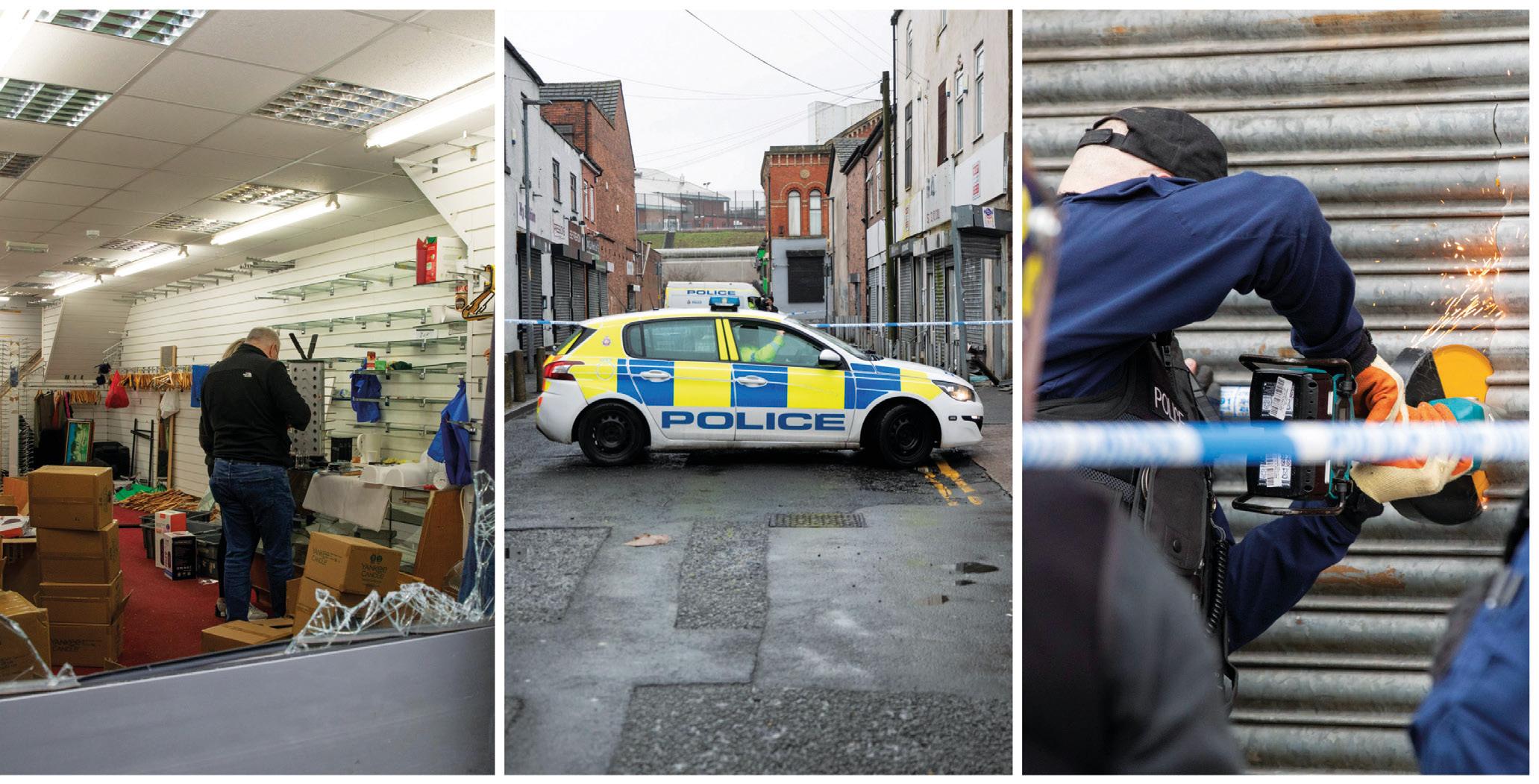
Something is happening in Manchester’s Cheetham Hill. Known as Britain’s ‘counterfeit capital’, a handful of streets have been home to dozens of organised crime gangs for as long as most Mancunians can remember.

The UK trade in counterfeit goods is estimated by National Trading Standards to be worth £8.6bn a year, with the small area of Cheetham Hill, north of the city centre, estimated to be linked to almost 50% of this illicit and harmful trade. That’s a staggering statistic.
Now Greater Manchester Police (GMP), Trading Standards and various other partners have decided that enough is enough. In a short space of time, a
dynamic multi-agency targeted action plan called Operation Vulcan is already having a dramatic effect.
Launched in November 2022 with the goal of tackling the organised crime gangs operating in Cheetham Hill and Strangeways, Officers working on Operation Vulcan say that more than 100 counterfeit shops have since been shut down, 96 people have been arrested for a variety of things including trademark offences, 332 tonnes of counterfeit clothing watches and shoes have been seized, and 30 joint visits have taken place with partners including Manchester City Council Trading Standards.
Detective Superintendent Neil
Blackwood is the Operational Lead for Operation Vulcan. He says that the work done in conjunction with Trading Standards has been essential.
“We couldn’t do this on our own. We have powers in legislation and we are a really strong lead on this because a lot of it is criminal enterprise. But once you start to move through the volume at the shops, a lot more becomes focused on individual traders, and that’s where Trading Standards have really stepped in. They made it really clear from the start – you ask for our help, we’ll be there every single time. We’ll make sure that we’re working together. We couldn’t do it without Trading Standards, it’s as simple as that.”
Counterfeit counterstrike
In just two weeks in late March/early April, more than £6m of counterfeit clothing was seized as part of Operation Vulcan, with 18 shops shut down during the same period. A multitude of fake luxury designer brands have been found, including Canada Goose, Gucci and Nike.
Meanwhile, gangs often use young migrants as illegal labour, paying them as little as £10 a day to be so-called ‘spotters’
30 | Summer 2023
Operation Vulcan By Helen Nugent
(people who watch for police) or to add labels to counterfeit goods.
As for the seized contraband, much of it is recycled. Since the inception of Operation Vulcan, more than 300 tonnes have been repurposed and turned into items such as hats, gloves, coats, dog bedding and house insulation which can benefit charities and community organisations.
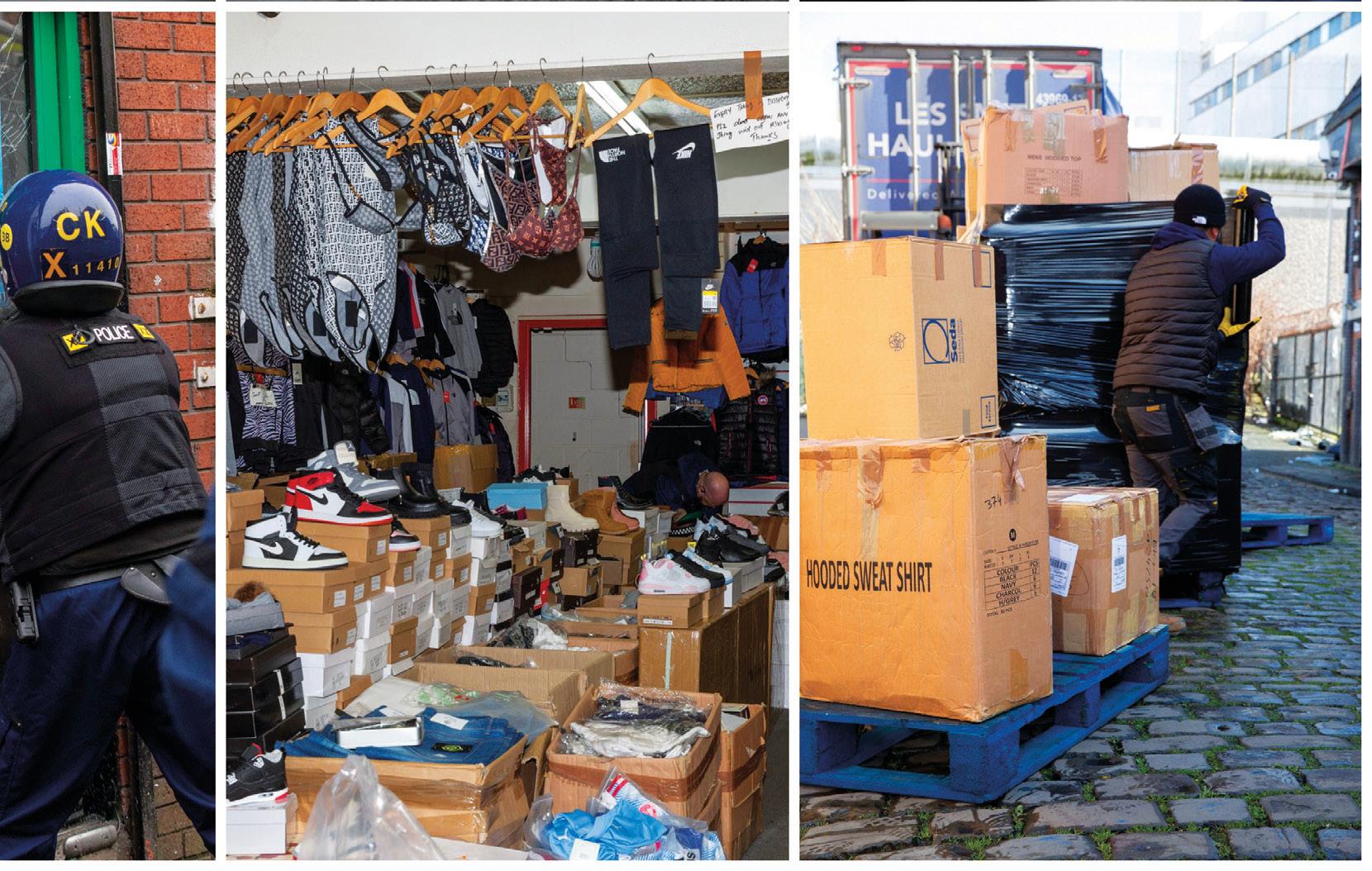
However, as anyone working in Trading Standards knows, part of the problem of closing down shops selling counterfeit goods is making sure that those outlets stay shut. How difficult is it for the police to ensure that stores fronting illicit goods don’t reopen a few months down the line?

“If we’re going through a property, we’re doing everything we can to decommission that property until the landlord says, OK, I’ll become legitimate or I’ll lease it to legitimate people,” says Blackwood. “For a lot of the properties, we’re looking at closure orders. But we also work differently; for example, instead of putting wood on a door to seal it, we get a firm to come with metal sheeting. It’s permanently closed until we say, right, you’re OK to open it again. So the landlords are forced to engage with us.
That’s been really successful… every shop we’ve raided so far has not reopened as a counterfeit goods shop.”
Building momentum
Lisa Seamark is Trading Standards Manager at Manchester City Council. She says that while Trading Standards has previously done a lot of work in Cheetham Hill, including the completion of a number of massive seizures, keeping the momentum up has been challenging given Trading Standards’ other responsibilities.
“The difference now is the momentum that Operation Vulcan is bringing because of the number of dedicated officers they’ve got specific to that area,” says Seamark. “It’s not just counterfeiting as there are lots of issues, but obviously the counterfeiting is a driver. It’s helpful
having that dedicated resource, and Vulcan are saying that they’ll keep that resource going for the next couple of years. We are there to support them in any way we can because it’s fantastic for us and it’s fantastic for Manchester.”
Seamark and Blackwood agree that engagement and education have been key, and not just with landlords and the local community. Education of the wider public has been – and will continue to be – crucial.
Seamark says: “Counterfeiting is not a victimless crime but that’s what people have generally thought. They’ve just thought, what’s the harm in it? But they’re not thinking about the other harm that’s going on behind the counterfeit industry. At the end of the day, this is organised crime, and would anybody give their money directly to an organised crime gang? No, they wouldn’t.”
She continues: “There’s so much more to it that people don’t think about; they are just thinking of getting that bargain and they’re not thinking about what’s behind that bargain. It’s been really great to be able to use Operation Vulcan to get those messages out to people.”
In terms of safety, Seamark says: “We recently submitted a couple of samples of counterfeit goods for safety testing. We found a pair of counterfeit sunglasses that failed the test for UVA and UVB transmittance. We also had counterfeit earrings with very high levels of cadmium in them. The safety of the goods isn’t something people think about when buying counterfeit goods.”
Today, the infamous stretch of road in Cheetham Hill feels different. Many of the shops remain boarded up, police tape can be spotted flapping in the breeze, and there’s evidence of a police presence.
Looking to the future, there is a longterm multi-agency commitment to the strategic redevelopment of Cheetham Hill and Strangeways. Nobody thinks this will happen overnight but, with money and resources being deployed effectively to make the area a hostile place for criminals to operate, there are reasons to be optimistic. l
www.JournalofTradingStandards.co.uk | 31
Journal of Trading Standards
“The landlords are forced to engage with us… every shop we’ve raided so far has not reopened as a counterfeit goods shop”
Officers conducting raids on shops in Cheetham Hill
Image credit: Greater Manchester Police
Duncan Stephenson Policy and External Affairs Director, CTSI
An attack of the vapours
Thanks to feedback from our members and the hard work of our new Lead Officers, CTSI has achieved tangible results on non-compliant vapes. Hopefully it’s a success that can be replicated elsewhere

In my last column, I set out our stall for some of the forthcoming attractions of CTSI’s policy and communications work. In this one I’d like to report on progress in one particular area.
Our new approach has involved us identifying, through member engagement and horizon-scanning, the priorities for CTSI policy. Vaping was one of these key areas, and our work in this space has occupied a significant amount of time for the first half of 2023. This has helped us make a huge amount of progress in putting the work of Trading Standards in the media spotlight, and has enabled us to successfully persuade Government of the need for greater direction, resources and review.
In our CTSI membership survey last year, we asked for your views on priority and emerging issues. It was clear that many on the frontline of Trading Standards were reporting ongoing and
mounting problems about the sale and supply of vapes to people under the age of sale, the growth in illicit and non-compliant products being sold in shops, and the headache that the seizure and disposal of these items causes to some local Trading Standards teams. Our members’ concerns very much reflect a significant shift in the supply and popularity of vapes. According to anti-smoking charity ASH, the number of young people aged 11-17 who vape increased from 4% in 2020, almost doubling to 7% by 2022.
In addition to the underage element, the issues with vaping have several touchpoints across the different areas of Trading Standards work. There are issues relating to counterfeit products or trademark infringements in which a potential loophole is being exploited to enable well-known brand names associated with confectionery and
soft drinks to be used to sell vapes –such as Skittles. The proliferation of non-compliant vapes being sold by shops and other retailers speaks to a wider problem about the confusion and responsibilities across the supply chain – of retailers, wholesalers and manufacturers of products – particularly when goods are seized.
Disrupting supply

The flood of non-compliant vapes on sale also speaks to the fact that there are significant problems about how we stop such products entering the market in the first place through our ports and borders (see cover story, p18). We need to cut the problem off at source in order to prevent local Trading Standards teams being overburdened and having to conduct ‘whacka-mole’-type policing of these products on the UK’s high streets.
Over the past year CTSI has been increasingly active in reporting these concerns in the national media. In January we seem to have captured the zeitgeist when we published our concerns that vapes were one of the biggest threats
32 | Summer 2023
DUNCAN STEPHENSON
MATT ALLWRIGHT
Our success on the vaping front clearly illustrates how vitally important it is for CTSI to actively engage with our members
the profession. We also called for an exploration of how better regulation could minimise the ‘youth appeal’ of vaping, including potential changes in the positioning of such products in shops – away from confectionery products, for example – and a review of some of the elements which may appeal to the nonsmoking underage generation – including the bright colourings, branding and promotion on social media. And we called for greater sanctions to tackle repeat offenders, while also helping to provide resources and education to support businesses do the right thing.
Making a splash
Aligned to our new vision, our new campaigning work has enabled us to voice concerns not just from the profession but also from consumers and businesses.


to high streets that our teams were facing – 60% of our members said that high street shops selling vapes to underage consumers or non-compliant products was the enforcement issue that concerned them most. Our communications work secured blanket media coverage for this issue and enabled CTSI and the Trading Standards profession more generally to convey our concerns.
CTSI has had to move very quickly on this topic to stay ahead of the curve. We developed and published the first in a series of position statements setting out the issues, the evidence and what we believe needs to happen. We highlighted that around one in three test purchases resulted in a sale to people under the legal age of sale – although we lacked a definitive national picture. Similarly, we drew attention to the fact a similar proportion of vapes sold currently are non-compliant with the Tobacco and Related Products Regulations 2016.
We called for clarity from Government – in this case the Department for Health and Social Care (DHSC) – on this issue, as well as additional resources to support
Following publication of our member survey and our follow-up policy paper, we secured unprecedented media coverage for CTSI and the profession, and had spokespeople featuring on all the main broadcast news channels, as well as in the press. We even made our first splash with a CTSI-inspired article in the Sunday Times Magazine. While appearances on the BBC Breakfast sofa, Daily Mail and Tik Tok are all well and good, quite often with media and campaign work it takes time to see results. We were therefore delighted and pleasantly surprised to see the DHSC announce additional resources for Trading Standards, and a call for evidence to identify what can be done to minimise the youth appeal of vaping.
Ok – the funding is not huge – it is only £3m and not the £15m that was called for in the Khan Review. It is for England only; and it is only for a couple of years. But it is a start and an acknowledgment that Trading Standards, which covers so many areas, cannot deliver what is expected without proper resourcing.
Our success on the vaping front is important for a number of reasons. Firstly, it clearly illustrates how vitally important it is for CTSI to actively engage with our members to identify current and emerging issues. As the national professional membership body it is our responsibility to give voice to these issues as well as supporting local and regional teams.
We have worked successfully with a number of different partner organisations. We helped to get messages out from the Medicines and Healthcare products Regulatory Authority (MHRA) in response to issues about noncompliant products, although the ad hoc arrangements we developed emphasise the need for investment in national co-ordination on the issue, which the additional funding will seek to address. We have also worked closely with our colleagues in National Trading Standards to develop a detailed plan for how the DHSC funding can be allocated.
Working in this agile way has also required us to work very closely with members and especially those who know this subject very well. We have been delighted to appoint several new Lead Officers for a Vaping portfolio, and I’d like to say a special thank you to Kate Pike, David Hunt and Marsha Bell for all their support in getting us to this next level by supporting our advocacy efforts and policy development activities.
This has also been a great opportunity for many in the new Head Office team to work more closely – and to get some great results. When External Affairs works well in organisations, it is outwardfacing and inward-shaping, and it is great to see that as well as policy and communications on this issue, CTSI has developed CPPD opportunities for our membership. Our Spotlight On… Vaping webinar attracted around 300 members to take part, and we are developing further CPPD opportunities on this issue.
We aren’t the Chartered Institute for Vaping – although it may have felt like that at times over the past few months –and we will be making good progress in other policy areas. However, the vaping issue has enabled us to shout about the vital work and key concerns our profession has – and both the media and the Government have listened. l
Journal of Trading Standards www.JournalofTradingStandards.co.uk | 33
Current affairs
Like many aspects of the net zero journey, electric vehicles represent an opportunity for environmental wins, innovation and consumer choice. But they also bring new opportunities for consumer harm
Exaggerated environmental claims, problems with charging infrastructure, pricing anomalies and ‘optimistic’ predicted driving ranges are creating headaches for some drivers who have already bought electric vehicles (EVs), and creating reticence among those still on the fence.
The Government stipulates that all new cars and vans must be fully zero-emission by 2035, which will inevitably mean a dramatic increase in the number of EVs operating in the UK in the near future. This will require a similarly dramatic increase in the number of charging points available and a shift in consumer behaviour; according to the Department for Transport’s ‘Taking Charge: the electric vehicle infrastructure strategy’ report (March 2022) the plan is to have around 300,000 public chargers as a minimum by 2030. The Government’s ambition is “to ensure these chargepoints are installed ahead of demand, inspiring confidence in drivers who have not yet made the switch”.
To that end, around 29,000 publicly available charging devices have already been installed, with a commitment of more than £2.5bn to the EV transition,

including nearly £1.7bn to support charging infrastructure.
These numbers are eye-catching, but there are other figures that should be of concern to consumers and regulators. According to the National Audit Office for example, the cost of using public chargepoints could be between 59% and 78% higher than charging at home and the CMA has estimated that people using public chargepoints could be paying £84 more per year than people charging their vehicles domestically.
Steve Playle, CTSI Lead Officer for Energy and Smart Meters, shares concerns that people unable to charge their EVs at home could end up paying over the odds. “Lots of people live in homes without driveways; lots of people live in flats,” he points out. There are also issues of energy grid security with domestic chargepoints. “All of the charging points that are installed will have to be smart chargers, which means that if the national grid is struggling to meet supply, electric car chargers will be switched off to keep the lights on. You may be merrily charging your electric car overnight, ready for a trip somewhere,
only to find that the battery is still flat the next morning. At the end of the day, we need to replace all that diesel and petrol with electricity. And that’s got to be generated by the grid. But if it’s not there, then Houston, we have a problem.”
The Government’s ‘Consumer Experience at Public Chargepoints’ report (updated March 2023) was published in response to a consultation which identified a number of consumer protection issues around EVs, including the need to support low-income households. For example, there are currently trials of charging solutions that allow people without off-street parking to charge on cheaper energy tariffs at off-peak times. One trial in Oxford is exploring the use of street adaptations so that people can run a cable from their house to their car through a gulley in the pavement.
The Government also says it will look at mis-selling of EV tariffs and bundles, and will “coordinate with the Electric Vehicle Energy Taskforce to make sure that consumers have access to the right information and advice to choose the right goods or services for their needs”.
34 | Summer 2023
Electric cars By Richard Young
Emerging market, emerging problems
In part because widespread take-up of EVs is still some way off, there is limited data available about complaints made to Trading Standards. According to Michelle Bucknell, CTSI Joint Lead Officer for the Motor Trade, “The main complaints are to do with advertised vehicle ranges and EVs not going as far as they’re supposed to on a single charge. In cold conditions particularly, the range is less.
“We need to monitor how many complaints are coming in and what they are about. There are issues with environmental claims, not just in electric vehicles, but generally. A lot of traders are jumping on the bandwagon of trying to sell products with claims that they are cleaner, when actually there’s not a lot of evidence to back that up.
“In general the advice to consumers is the same as for any other type of vehicle: only purchase from a reputable dealer so if you’ve got any problems, you’ve got a better chance of getting them rectified.”
Owen Kennedy is also CTSI Joint Lead Officer for the Motor Trade. “At the moment, the uptake of electric vehicles is being held back by a number of things,”
he says. “It’s being held back by the price [new models range from around £50,000 up to over £100,000]; it’s being held back by availability. And there are problems with infrastructure.
“I think we will start to get a rise in complaint levels when the usage goes up. Then we will really get some idea of whether the quoted range figures, for example, are anything close to accurate.”
As an EV owner herself, CTSI Chair Tendy Lindsay has first-hand experience of some of the emerging problems with pricing and infrastructure: “I was recently charged £58 by a public chargepoint, when I would normally pay £26,” she says. “There was nothing to indicate the price until I’d finished charging. With some of them you have to register with an app, which takes money even if a machine isn’t working.
“Consumers have to be wary; they must get all the information beforehand. It’s important to make sure you know exactly how much you’re being charged per kilowatt. Also find out if it’s cheaper to go to a particular chargepoint.”
The aforementioned ‘Consumer Experience at Public Chargepoints’ report acknowledges that “consumers should be able to understand and compare pricing offers across the UK network to select the best available price, as is currently the case for petrol and diesel vehicles”. However, at present there is little concrete legislation around pricing at public chargepoints. The Electric Vehicles (Smart Charge Points) Regulations 2021, which are overseen by OPSS, apply to domestic chargepoints only.
Room for optimism
James Court is Chief Executive of the Electric Vehicle Association (EVA) England, which represents the interests of current and prospective electric vehicle drivers. He concurs with many of the problems identified by Trading Standards Officers. “The range of an EV


depends on so many different factors, and it is really a balance between trying to give the most accurate picture you can, whilst also keeping it understandable and transparent to consumers,” he says. “As with all cars, range and efficiency is worse in the winter, and worse when driven at high speeds.
“I think dealerships are already getting better at this but there is a huge amount of legislation that we would like to see. There are also a huge amount of claims made which actually are not true. Learning about different driving styles and how the range is affected in different scenarios, is something that dealerships should be acknowledging more.
“The biggest issues that we see are reliability of chargepoints and the transparency of that data. Mostly, as a rule, there are enough chargers in this country; you just don’t necessarily trust them once you get to them. We need to try and get the bad legacy infrastructure off the system.”
In general though, once the teething problems are addressed, Court thinks EVs mark a step in the right direction for consumers and the environment, including in the still-nascent second-hand EV market. “There are fewer things to go wrong with an EV than with a petrol car, and it is much easier to test the health of the car and its battery. There are already companies that offer battery testing but we do need some sort of recognised industry standard to build consumer trust.
“When you have certain companies advertising ‘self-charging hybrids’ I think the ASA should be looking at that more. But according to any independent study I’ve seen, the environmental benefits of EVs far outweigh petrol cars. Is there more the industry can do when it comes to sustainability? There is. But for an industry that has only been going for a few years – and a lot of these cars are still in their first model – there is plenty of room for improvement, and the cars themselves are getting better.” l
www.JournalofTradingStandards.co.uk | 35
Journal of Trading Standards
Consumers have to be wary; they must get all the information beforehand. It’s important to make sure you know exactly how much you’re being charged per kilowatt
Better regulation: the UK’s USP




































In July 2013, I had the privilege of being one of the witnesses for the House of Lords Select Committee on Soft Power and the UK’s Influence, which was chaired by Lord Howell of Guildford. As part of my contribution, I discussed my speech at that year’s CTSI Conference in Brighton.
Perhaps you were there in Brighton in 2013. Did you rather expect that I would complain about the burdens of regulation on SMEs? Yes, I did a little bit of that, but what I talked about mostly was that the UK has the best regulations in the world.

If you buy a British product or service abroad, you know the purchase is legitimate, it is transparent and there is a redress and complaints procedure. I think that is something we need to build on so that the world looks to us for better regulation models and frameworks. That is one area of soft power that will give us ongoing competitive advantage.
One of the biggest challenges we have in doing business with the Indian subcontinent, for example, is regulation in terms of import and export, especially around food. I propose that better regulation is the USP that sets us apart – and the rest of the world, including the World Bank, wants to adopt our model.
Rather than just taking SMEs to India, I am taking British regulators to




a conference there. As a result of that, Indian regulators now want to come to this country and adopt our best practices as well. Those are soft skills, the influencing skills that we need to build on.
The roll-out of my submission to the noble Lords manifested itself in many ways. The Local Better Regulation Office (LBRO) supported the initiative via funding from the Foreign and Commonwealth Office, with a secondment of CTSI Service Director, Phil Owen, to India. He worked with the British High Commission, the Indian Ministry of Commerce and regional government institutions to disseminate best practice in regulation to several key institutions.
A long-term outcome of the project was a significant reduction in regulatory burdens, improvements in India’s ranking in the World Bank’s Ease of Doing Business Index and greater business confidence in the regulatory landscape to encourage further trade and investment opportunities. The LBRO also reached out, via the World Bank, to Kenya, Tanzania, Indonesia and eastern Europe.
In 2014, the European Union banned the import of Indian mangoes due to an infestation of tobacco flies. On behalf of the UK importers and freight forwarders, with support from the Indian High
If you buy a British product or service abroad, you know the purchase is legitimate, it is transparent and there is a redress and complaints procedure









Commission in London; Lord de Mauley – then minister at Defra; and Trading Standards Officers at Hounslow and Solihull Councils, I managed to create a dialogue with the Indian Agricultural and Processed Food Products Export Development Authority (APEDA) via Prime Minister Modi’s office in Delhi, UK regulators and the European Commission. This manifested in several regulatory roundtables in the UK, Brussels and Mumbai.
The outcome was the lifting of the Indian mango ban. This success was led by men and women within the Indian and UK regulatory framework, with its legacy being a sizeable growth in bilateral trade between the UK and India in agricultural products, processed food and spices.
36 | Summer 2023
The UK is recognised globally for its robust and practical regulatory frameworks – due in no small measure to the work of TSOs, says CTSI Non-Executive Director Uday Dholakia
Regulation By Uday Dholakia
Uday Dholakia
Pathway to good regulation























































































Last year I joined CTSI as a Non-Executive Director. It’s a privilege for me and I would like to express my gratitude to CTSI for this opportunity to carry on my passion for better regulation. My journey, a privileged pathway in advocating the UK’s real USP to the world, has encompassed consumer representation in electricity supply, probation services, broadcasting, policing, civil aviation and better local regulation. Also last year, I was part of the judging panel for the CTSI Hero Awards. I was deeply impressed by all the nominees and winners. What struck me was the important work that Trading Standards Officers and their partner agencies do to protect consumers, businesses, employees and environmental interests.




This reinforces my strong belief that the leading USP of the UK Plc is not banking, insurance or tourism – important though these are to the economic wealth of the country. People around the world invest in the UK, buy British goods and services, and send their children to schools and universities here because of our sound regulatory oversight.




























In November 2022, I attended the UK Trade & Export Finance Forum, which was organised by the Department for International Trade to bring together British trade and finance managers from around the world for the benefit of British exporters. In one of the many practical insight sessions, one of the contributors, Richard Clothier, Managing Director of Wyke Farms in Somerset,
People around the world invest in the UK, buy British goods and services, and send their children to schools and universities here because of our sound regulatory oversight

a major exporter, was asked about the most valuable advice he had received. He replied that “Regional Trading Standards teams have been helpful and supportive in our export journey.”






























In terms of the current debate on regulation and regulatory bonfires in the Westminster village, I agree with Will Hutton’s view that “Regulation is the foundation of our civilisation. I am delighted that older cars must have MOTs, that employees have a right to paid holiday, that the drugs the doctor prescribes are safe, that lead in paint is prohibited, that the pesticides used in gardens won’t kill us, that the water we drink is clean and that restaurant and pub kitchens are regularly checked.”1
I salute the men and women who keep us safe and carry out their duties with commitment, and often without recognition or adequate resources. My commitment as a Non-Executive Director of CTSI is to make a difference for them, and in a small way create connectivity for CTSI internationally. ●
www.JournalofTradingStandards.co.uk | 37
1 ‘Jacob Rees-Mogg’s crazed tilt at red tape is quixotic nonsense. We need regulation to survive’; Will Hutton, The Guardian, 12 February 2023
Uday Dholakia is an experienced Board member of regulatory bodies and a Non-Executive Director of CTSI
Colour me bad
Back in the mid-80s there was a band that went by the name Color Me Badd. Whilst I thought it was an unusual name for a pop group, the name stuck with me as I initially thought it was to do with skin colour.
During that period we were largely inspecting shops that had a number of dangerous unlicenced toys such as Teletubbies and Teenage Mutant Ninja Turtles, and cosmetics. The area that fascinated me the most was cosmetics. I had a case against an importer who had imported thousands of unsafe skin lightening creams. I worked with the Chief Chemist at GlaxoSmithKline at the time as there were counterfeit versions of their product containing excessive hydroquinone. He explained the dangers and harm it caused by thinning the skin and different levels of toxicity that entered the blood stream. At the conclusion of our case, I issued a press release with the dangers associated with the use of this type of product. Upon further inspection, at the same premises over the following years, I discovered not just the same products but even more imports of a similar nature.

I once teased a trader in the London borough I was working in, “Why do you sell this poison?” whilst seizing his stock from under his counter. “Because they want the good jobs” was his reply. I was aware of this type of thinking and it had me asking why some people are prepared
to risk their health for the prospect of obtaining what is perceived to be a better position in life due to colourism. Where does that thought process come from?
It is a long-held view, backed up by statistical evidence related to jobs, homes and the judiciary, that if you have a more ‘European’ look, you would be considered more desirable and therefore be better positioned for whatever circumstance you may be facing. A mature woman in my office block described herself as having ‘high colour’ as she was of fair complexion. This type of colonial thinking and language has passed through the generations. She continues to believe this as she has witnessed the benefits and possible indoctrination through the media, adverts, film and TV.
Colonial hangover
My friends from the Indian diaspora have also informed me that skin colour can determine their place in society, including who they get to marry. During recent visits to Indonesia and Malaysia, I saw people walking with parasols and white powder on their faces seeking a porcelain look. This is considered the ideal appearance following these countries’ colonial past.
I have had several conversations with colleagues regarding the use of skin lightening creams in relation to an ongoing London Trading Standards

1 ‘The Ritz apologises after candidate for job was told Afro hairstyles were banned’; Josh Layton, Metro, 5 April 2023


2. ‘Black pupils are being wrongly excluded over their hair. I’m trying to end this discrimination’; Emma Dabiri, The Guardian, 25 February 2020

38 | Summer 2023
As well as often being dangerous and illegal, skin lightening cosmetics raise some important questions about the society we live in – and they should be on every TSO’s radar, says Giles Speid
Skin lightening By Giles Speid
“Outside of London, colleagues may not necessarily be seeking out these products… but they are poison in a jar”
Giles Speid
project. In one current case, a recent seizure revealed that the importer not only brought in thousands of unsafe products but was producing skin lightening products herself too. There was no evidence of product testing or qualifications in the field of chemistry or biology. All she had was an unsuspecting market with an address label list of customers at the ready.
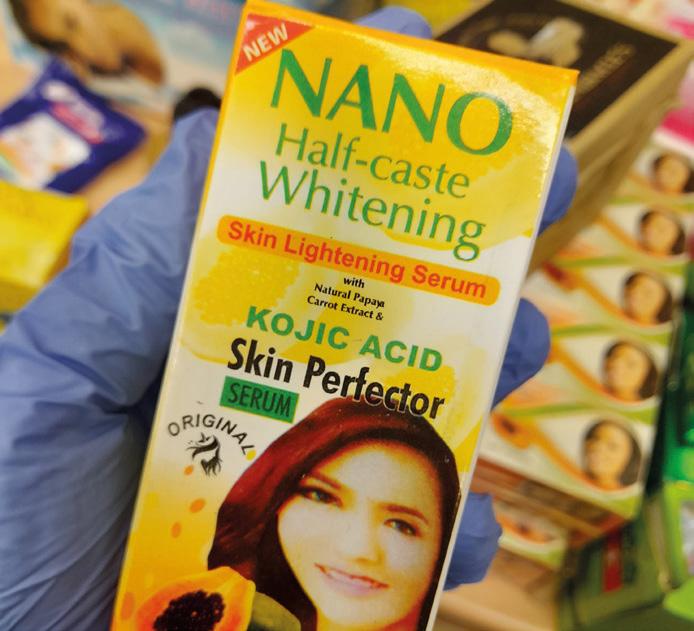




Paradoxically, the opposite situation also often arises. Environmental Health colleagues have visited and warned many salons of excessive sunbed use which is associated with an increased risk of skin damage, including premature ageing and skin cancer. It appears many people are looking for that ‘Fenty Beauty’ mid-range colour and are prepared to be damaged to get it. Whereas the person using excessive sunbeds is unlikely to be discriminated against, the person not using skin
lightening cream believes they will be.
Phil Jenkins, who has been Port Compliance Officer at Hillingdon Trading Standards for 15 years, says: “People used to sneak these items into the country by sea in small amounts. Now they are coming by air. Importers are unafraid to bring in as much as 2.5 tonnes of these dangerous cosmetics as they are no longer considered a priority to be checked, in the same way that food is.”
There is no fear of reprisals and therefore the problem goes undetected until spotted by a vigilant TSO.
Outside of London, colleagues may not necessarily be seeking out these products in markets or areas frequented by certain demographics. Complaints about these products are rarely made, but they are poison in a jar.
Warped standards
Similar issues have arisen with hair straightening products which have in some cases led to alopecia. Afro hair continues to raise issues in the workplace1 and schools2. School decisions and policies regarding having hair no longer than two inches for boys favours Western appearances and hairstyles.
That has led to decisions being considered discriminatory as a result
of unconscious bias, even leading to pay-outs for discrimination. The thought that having something that grows out of your body naturally being considered offensive, has caused children to be excluded from school. In the corporate world the pressure and expected norm is to have short hair or at least wear your natural hair straight, or use a weave or wig of similar appearance.
The temptation to touch and feel the texture of someone else’s hair is not advised, especially without invitation. One TSO who had her hair straightened decided to return to her natural curls and was told by her manager that he preferred her to have her hair straight. This caused her angst as she naturally wondered if this was going to be a barrier to her having a successful career in the service. She eventually left that employment… with her natural curls. If this was ever raised as an unconscious bias issue with her former manager, she believes he would most likely have defended it as just banter. Well that’s funny… if only it was. l
www.JournalofTradingStandards.co.uk | 39
Journal of Trading Standards
(Left, below) Examples of illegal skin-lightening cosmetics seized by London Trading Standards
Giles Speid is a Trading Standards professional and Team Manager – North West Teams at Westminster City Council
SYNTHETIC SCAMMERS
The speed of innovation in artificial intelligence has played into the hands of fraudsters, making it increasingly difficult to protect against ever more sophisticated and evolving scams

Businesses, government agencies and organisations around the world are all racing to figure out how to make the best use of artificial intelligence (AI). However, just as more applications for AI come to market, at ready availability, the technology and its remarkable possibilities are already sitting comfortably in the hands of scammers and fraudsters. Generative AI is powerful and compelling despite still being in its nascency; but fraudsters have been quick to see its potential, and enforcers and regulators are struggling with the new challenge.
So far, generative AI has been linked to everything from phishing scams to cloned audio imposter scams, ‘whaling scams’ targeting high-level executives, live voice identity scams, deepfake videos, fake positive reviews and much more. Especially alarming is the fact that voice cloning software is becoming much more accessible and in many instances requires
just a three-second audio sample to simulate a voice.
Scams targeting celebrities are making headlines: one German newspaper published quotes attributed to a chatbot that realistically impersonated racing driver Michael Schumacher while another AI engine wrote and performed a full pop song that synthetically mimicked performer Drake. In both cases, audiences were completely duped, illustrating the ability of the technology to deceive.
While cases of this sort have led to a range of worrying questions, the publicity they have produced has helped bring consumer attention to the level of sophistication that AI makes possible, and allowed enforcers to alert the general public to be wary of clone scams.
“We’re very, very fortunate at the moment because we’ve got quite a good relationship with the media, says CTSI
Lead Officer for Scams and Doorstep Crime, Katherine Hart. “Dare I say we do rely on the media to put that information out and then for people to react to it. We have to make people take responsibility and be cautious.”
Hart believes the best kind of protection is in raising awareness by circulating information about common fraudulent practices, encouraging people to look for warning signs, and spreading the word about what a consumer should do if they become the victim or target of fraud. There are however significant hurdles such as limited budgets and the difficulty in locating the scammers, many of whom are based overseas. Significantly, many consumers do not report incidents, making it all but impossible to get an accurate picture of the scale of the problem.
“We really have to encourage people to report incidents. What we have found about doorstep crime and scams is that they are often very underreported. People are too embarrassed to speak up,” says Hart. “With generative AI scams, we are relying on interaction from communities to actually tell us what’s going on.”
40 | Summer 2023
AI Scams By William Henry
Equal opportunity fraud
Another major issue in chatbot-activated fraud is that it does not target particular demographics. With most other scam types, fraudsters target those perceived as particularly vulnerable, preying on those susceptible to falsehoods and impersonation. However, the sophistication of generative AI and the fact that it is in use across online ecosystems – from social media to bank websites – means that everyone is potentially a target. That makes communicating the different and unique risks much more difficult.
It is important to acknowledge however that not all AI is being used for nefarious purposes. Businesses are finding ways to automate repetitive tasks, improve sales and generally project manage. At the consumer end, AI is becoming normalised, with customers becoming more comfortable engaging with chatbots for advice and suggestions.
In terms of regulation, rule-makers are attempting to move forward to apply understanding to the immediate and longer-term consequences of the presence of AI. As in many areas,

4,783
£4bn
however, different regulatory bodies are approaching the phenomenon in different ways, and solutions are likely to arise at different times, meaning regulatory arbitrage is probable.
At the European Union level, for instance, research is being carried out in various industries to attempt to create a thoughtful approach to rules, while member states – such as Italy – have taken a firmer approach and banned certain AI applications altogether, pending review. Similarly, in the US, the Federal Government is assessing the technology’s impact while certain states are looking to draft rules quickly, wary of the speed with which the technology is developing. A key hurdle for regulators will be in data use: Europe’s General Data Protection Regulation (GDPR) and a handful of US states (California and New York among others) have created rigid consumer data protection regimes over the past few years that should factor prominently in any new rules. With the management and sharing of data being the backbone of AI, a host of issues must be addressed.
In the UK, the Government has proposed a number of core principles
for developers and end users: AI must be used safely, be technically secure and function as designed; there must be appropriate transparency, an identified legal person responsible for the AI, and its use must comply with guidance – yet to be defined – from regulators. As part of its National AI Strategy, the Government’s plan is for regulatory bodies assigned to each individual sector to issue specific guidance. Within financial services, the Financial Conduct Authority (FCA) has conducted research and requested comment – a standard approach before draft rules are considered. The body has stated that it has “carried out extensive work to understand AI and consider its regulatory implications, as well as utilising AI methods to identify bad actors.” Other bodies – such as the Medicines and Healthcare products Regulatory Agency (MHRA) – have stated the need for “clear requirements to ensure healthy and productive AI use. Aside from this, little guidance has been put in the hands of enforcement officers.

Growing problem
What is worrying now will soon become alarming. The UK had the highest number of cybercrime victims per million internet users at 4,783 in 2022 – up 40% on 2020 figures. Last year alone, £4bn was lost to cyber fraudsters in the country.
For CTSI, continual engagement with the police and national fraud agencies is paramount. According to Hart, social media platforms should be held responsible for illegitimate actors as well as providing enforcers with open lines of communication to consumers in order to warn of the risks and issue best practice advice. She adds that consumers must take responsibility when the threat of fraud arises. “As consumers, we’re so busy and we just want to get where we’re going online as quickly as possible. Consumers need to have a little bit of responsibility too,” she says. l
www.JournalofTradingStandards.co.uk | 41
UK cybercrime victims per million internet users in 2022
Journal of Trading Standards
lost to cyber fraudsters in the UK in 2022
Snake oil salesman
A prosecution by Southwark Trading Standards resulted in a guilty verdict for a religious leader who duped his congregation into paying for bogus ‘COVID cures’. We hear from the officers involved
Bishop Climate Wiseman, a self-styled faith healer and religious minister at the Kingdom Church in Camberwell, South London, first came to the attention of Southwark Trading Standards shortly after the UK went into the first COVID lockdown in March 2020.
Reports came in that Wiseman was offering ‘Plague Protection Oil’ to his congregation for £91 a bottle, falsely claiming that it could prevent or cure COVID-19. It was a time when false and potentially harmful claims about coronavirus and its treatment were rife; according to Ofcom data released in the bleak days of April 2020, more than half of UK adults were being exposed to misleading information about the virus, with 40% finding it difficult to separate fact from fiction.
Justin Miller, Southwark Council Trading Standards Team Leader, explains: “We received a message from the local police that Climate Wiseman was selling an item which purported to be a cure for COVID. Southwark Trading Standards engaged with Wiseman and told him, verbally and in writing, that he couldn’t make these claims, and that he could get into trouble.
“The BBC had also found out about this and they sent an undercover journalist who made a test purchase of the oil. We made contact with the BBC and got statements from their reporter. They passed us the oil itself and we found that it was just olive oil with cedar wood and hyssop added to it. We approached Wiseman again and told him we wanted to interview him about the matter. We didn’t have any engagement from him at all though – he just didn’t respond.”
Wiseman had a track record of making
spurious claims about the health benefits of products he was selling; in 2016 he had been warned by Southwark Trading Standards after claiming that oils he was advertising on his website could cure cancer and HIV.
When it emerged that he was exploiting his congregation during the COVID pandemic, Southwark Trading Standards took the decision to prosecute.
Senior sign-off
Miller said: “Because of the sensitivity of prosecuting a religious minister, we had to get quite high sign-off within the council. We went to strategic director level because we wanted everyone to be aware of what was going on. And we had full support from management.”
It was important to prosecute Wiseman because his actions put people at risk during a particularly difficult time for the local community and the country as a whole, explains Earl Legister, Business Unit Manager – Environmental Health and Trading Standards at Southwark Council. “His actions gave people a false sense of security. His congregation was being told that the oils he sold would fight the coronavirus or cure it in some way.
“This was against the backdrop of a very challenging situation that the whole country was going through, and people were desperate for something to be able to hold on to. He was preying on that and taking advantage of their vulnerability.”
Wiseman was found guilty of fraud at the Inner London Crown Court on 8 December 2022. On 6 February 2023 Wiseman was given a one-year prison sentence, suspended for two years, and ordered to undertake 130 hours of unpaid work.
He was also ordered to pay the council £60,072.50 to cover their legal costs.
“These were unprecedented times and people were really scared,” says Miller. “This was nothing more than cynical exploitation.”
An expert in public health from Imperial College, London, told the court that Wiseman’s claims about his oil mixture were at best misleading and the MHRA confirmed that in March and April of 2020, no licensed products existed for the treatment of COVID -19.
The judge was noted as saying it was “the very worst example of snake oil salesmanship he had seen”.
Charity investigation
Separate from the Southwark Trading Standards prosecution the Charity Commission launched an inquiry into the Kingdom Church, which is ongoing. The investigation is examining the church’s trustees’ compliance with their legal duties around the administration, governance and management of the charity, as well as the extent to which the trustees responsibly managed the charity’s resources.
According to Helen Earner, Director of Regulatory Services at the Charity Commission, “Charities should be organisations that people can trust. Many will have been concerned by allegations about this charity’s activities in relation to COVID-19, and so it is right that we, and others, have intervened. Our own examination into The Kingdom Church GB has identified further concerns that require investigation which is why we have now opened an official inquiry.”
Legister believes the case highlights
42 | Summer 2023
Bogus health claims By Richard Young
People were desperate for something to be able to hold on to. He was preying on that and taking advantage of their vulnerability
the important role Trading Standards plays in safeguarding local communities during times of crisis: “We will not sit idly by and allow these things to happen when they come to our attention,” he says. “Members of the public often don’t realise the work that goes on in the background to keep them safe. When they see these types of cases, they get a better appreciation of what we do.
“Wiseman was exploiting and abusing the trust of his congregation when he should have been providing reassurance. It’s something that really didn’t sit very well with the courts, hence the guilty verdict and the sentence.”
The case also provides a lesson for other Trading Standards teams who may find themselves fighting bogus health claims while taking religious beliefs and community sensitivity into consideration. “The main thing was to involve our legal team as early as possible,” Miller says. “We had input from our barrister, Richard Heller, at a very early stage. It was also important to get senior management buyin coupled with expert legal advice.
“In the end, we applied for costs for just over £60,000. The judge reviewed Wiseman’s financial affairs and was satisfied that he could pay,” Miller adds. “We got full costs, which is pretty unheard-of.”
“The fact that Wiseman had been warned by Trading Standards for similar activities in the past was a serious aggravating factor,” says Legister. “The verdict shows just how seriously the courts view these kinds of offences.” l
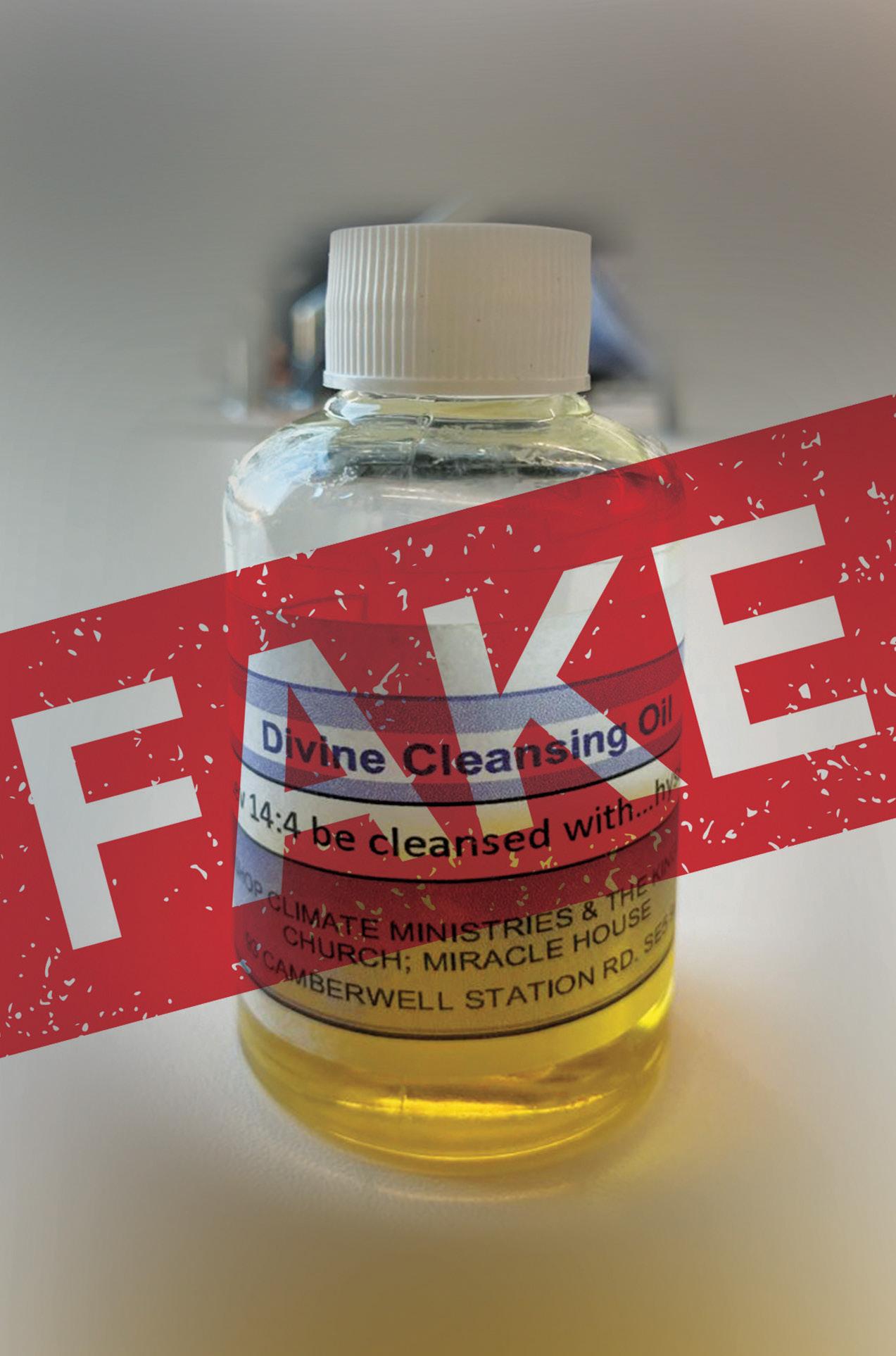
www.JournalofTradingStandards.co.uk | 43
Journal of Trading Standards
A bottle of Wiseman’s bogus ‘COVID cure’ obtained by Southwark Trading Standards
Image credit: Southwark Council Trading Standards

44 |
YVONNE FOVARGUE MP

As consumers struggle with ongoing cost-of-living hardships including scams, illegal money lending and harmful products, the Chair of the APPG on Consumer Protection discusses why Trading Standards should be more central to the political conversation
BY RICHARD YOUNG
Yvonne Fovargue began her career as a Housing Officer in the Moss Side area of Manchester in the early 1980s and went on to work at the then-Citizens Advice Bureau in St Helens before entering Parliament as the Labour MP for the Makerfield constituency in 2010. Now, in her capacity as Chair of the All-Party Parliamentary Group (APPG) on Consumer Protection – of which CTSI serves as secretariat –Fovargue works ‘to provide a voice for consumers and to raise awareness of issues, rights and obligations in the field of consumer protection’.
“I was manager of the Citizens Advice Bureau in St Helens for 23 years,” she says. “We had a lot of clients coming in with consumer issues and I always felt I’d like to do something about it. We had a lot of people who were defrauded and who had problems with faulty goods. A lot of people simply didn’t understand their rights and what the responsibilities of the traders were.”
It has been a busy – and difficult –period for consumer protection, first with austerity impacting the resources available for enforcement, then the COVID pandemic causing mass upheaval to buying habits and business practices, and now the cost-of-living crisis bringing fresh problems. What has the APPG been focused on since Fovargue became Chair? “We held an inquiry into the
ombudsman system and whether it was too confusing for people who wanted to take a complaint further on a number of issues,” she says. “Our recommendations were that there needs to be a simplified portal for ombudsman services, so that people know where to go if they have any problems.
“We also recommended that there needs to be an ombudsman for travel, which was brought into sharper focus through the pandemic, when people were having issues reclaiming costs for holidays that were cancelled through no fault of their own. People were being given offers of different holidays when in fact, some of them needed the refunds because they didn’t have the money during the pandemic.
“We’re also looking at the issue of frauds and scams; we work very closely with the APPG on Debt and Personal Finance, which I also chair. Some of the scammers are extremely sophisticated. In fact, I recently spoke to some people from the Association of British Insurers who said that they wouldn’t have spotted a couple of the scams that came through.
“One of the big issues at the moment is that people want to save money and they’re not always buying safe, or even legal goods. We’ve looked quite a lot at the work of Trading Standards, how it’s almost diluted now, and how difficult it
is for local Trading Standards Officers to actually fulfil a whole range of the duties that people expect them to fulfil.”
In addition to becoming more diluted, the consumer protection landscape has become increasingly fragmented in recent years, I suggest – does that create confusion for ordinary members of the public? “I think it does, and I think there’s often a misunderstanding of the difference between things like a trade body and an ombudsman,” Fovargue says. “One of the issues we found was that someone was calling themselves an ombudsman, but they weren’t actually. There’s a problem with the statutory underpinning of some of the services as well. People are often horrified that they might win their case, but they don’t get anything back.
“It is very confusing for people as to where they go if there’s a problem. The fact that the Trading Standards department where a business is based has to deal with a problem can cause confusion as well. As a constituency MP, I had an issue with a kitchen firm, but it wasn’t based in Wigan. People came to us and said they wanted to take it to Wigan Trading Standards, and we had to say well, no, actually, you can’t do that.
“Recall of faulty goods has also been a big issue for a long time, and there’s a lot more that needs to be done. One
IN CONVERSATION
In conversation: Yvonne Fovargue MP Journal of Trading Standards | 45
www.JournalofTradingStandards.co.uk
of the things I’ve been pushing for is registration at the point of sale of the address that goods are delivered to. If they were registered on a central database that could only be accessed in the event of a recall, it would be an easy win for the retailer or manufacturer, which could then concentrate on the harder-to-reach ones. The whole system of having to register your own goods is absolutely ludicrous.
“Another problem is trying to get goods that have been recalled taken down off the online platforms quickly enough –they tend to be quite slow to do that.”
Online harms
Regional restrictions on enforcement are exacerbated when, as is often the case, an online business is based overseas, Fovargue says. “There’s a particular issue with electrical safety and safety of toys; we’ve been dealing with Wish.com [based in the USA] and Alibaba, which is based in China. The other problem we’ve found is with Amazon Marketplace, in that consumers believe they’re buying from Amazon when they’re actually buying from a third-party seller.”
People are particularly vulnerable to all kinds of consumer harm at the moment as they deal with the cost-of-living crisis, whether that’s because they are trying to save money on certain products, or being targeted by scammers. I ask Fovargue whether she’s seen any consumer protection problems in her constituency that are becoming more common.
“Online scams have been a big problem,” she says. “Romance fraud has been a particular one; during the pandemic and after, people who are feeling lonely have been scammed out of thousands of pounds – in one case, £20,000.
“Other scams are the ones that guarantee people that they can save money, like circuit regulators or voltage optimisers that claim they will save on your energy bill, whereas what they will actually do is absolutely nothing. I’m particularly worried about people selling unsafe goods – the cheap alcohol that doesn’t do anyone any good to drink, the cheap electrical goods, the hair dryers that set your hair on fire.
“We’re also concerned at the moment with ‘buy now, pay later’ schemes. Many of them are not actually advertised as borrowing; the product is front-andcentre. It may have a high rate of interest, but that isn’t what’s advertised – the credit is very much secondary and the fact you’re borrowing is not emphasised.
“We’re looking at misleading adverts and things like fake five-star reviews as well. We do quite a lot of work with Money Saving Expert; they sponsored the APPG report on the ombudsman service. We look at problems that people are coming to them with, as well as what’s coming to other MPs through their constituency casework.”
The backdrop to the cost-of-living crisis is the UK’s difficult economic situation, with the constant prospect of further cuts to public services. That raises particular concerns about potential cuts to local authority Trading Standards. “I think local authorities are going to be very hard-hit,” Fovargue says. “You can see it now; the amount that local authorities have got in real terms has dropped 80% since 2010. It’s unsustainable, and it’s unsustainable for Trading Standards, who do a lot of the unseen work to keep people safe.”
We’ve looked at the work of Trading Standards, and how difficult it is for trading local Trading Standards Officers to actually fulfil a whole range of the duties that people expect them to fulfil

It’s a good idea to hold events that have a good photo opportunity for MPs. You know the old saying that they’d turn up to the opening of a fridge
Economic impact
When it comes to that unseen work, Trading Standards deals with substantial threats to the UK and the wellbeing of its people; for example, things like animal disease outbreaks which can cost the economy billions, or tragedies like the Grenfell Tower fire, which was caused by a faulty electrical appliance and unsafe building materials. Does Fovargue think the role of Trading Standards in regularly preventing those kinds of crises is appreciated within Government?
“I don’t think it is,” she says. “The
whole range of Trading Standards work is so wide that people only see one particular part of it and don’t see the rest. I’ve worked with our local Trading Standards departments in St Helens and Wigan for over 30 years. I’ve seen how they’re struggling to cope now with all the demands that are placed on them. But I don’t think many MPs come from the same background where they’ve had long contact with them.
“I’ve seen what they do and I think it’s important that awareness of Trading Standards is raised in Parliament; it’s always a good idea to send MPs information about dangers to their constituents. It’s also a good idea to hold events that have a really good photo opportunity for MPs. You know the old saying that they’d turn up to the opening of a fridge – get a good photo that you can put in the local paper and issue a press release with it.”
There’s an ideological viewpoint among many on the right that regulation
46 | In conversation: Yvonne Fovargue MP Summer 2023
Consumers are finding themselves ever more vulnerable and turning to resources such as food banks to make ends meet
and compliance are a burden on business; I suggest that compliance helps legitimate businesses by creating a level playing field and minimising the risks they are exposed to. “Absolutely. I think it is more important now, following Brexit, that people realise that unsafe goods are coming onto our shores, people are being scammed, people are losing money, and that money could be spent with reputable traders. I think the good traders realise that regulation is to their advantage. It’s the ones who want to get round it who are complaining about the burden of regulation. Most of the time the ‘burden’ is there to protect people.”
Much of the work with which Trading Standards is involved – for example, combatting false environmental claims, or promoting social justice by encouraging fair play and protecting the most vulnerable, aligns with progressive political ideals. Clearly there’s an opportunity to work more closely with


like-minded groups and individuals. “Consumer protection needs to feed into policy for the future,” says Fovargue.
“With personal finance for example, we need to look at how we can create credit that is accessible to those who don’t have a great credit history so they don’t have to go to illegal moneylenders.
“The Illegal Money Lending Team do a great job, they really do, and I’m glad that they have had their funding restored. But more and more people are going to illegal money lenders because they can’t see any other way out. People need access to affordable credit but unfortunately, those who can afford it the least have always
paid the most. Taking away the common bond and some of the restrictions on credit union lending would help those people. And that’s something we’re going to be looking at in the future.”
As this issue of the Journal was going to press, it was announced that the sunset clause of the the Retained EU Law Bill had been scrapped, preventing – for the time being at least – the potential loss of swathes of vital consumer protection legislation. Like many, Fovargue has significant concerns about the Bill. “You can’t just get rid of things wholesale without examining the consequences, intended or otherwise,” she says. “The reason I went into politics is because I saw the unintended consequences of legislation. Well, there are many unintended consequences to removing legislation as well. It needs to be put to Parliament how important retained laws are to people’s safety and wellbeing.
“We have to make people aware that actually, there is a reason for regulations, and let’s not throw the baby out with bathwater. I’m in favour of statutory regulation for quite a number of things, because I don’t think self-regulation in many places has worked – particularly for those least able to afford to complain.”
Finally, I put it to Fovargue that many of the issues Trading Standards deals with stem from misinformation, whether that’s misleading claims, or out-and-out scams – and there are many aspects of our social and political discourse that are affected by the same problems. “There’s a problem in politics and in general, where we’re almost following the American line where things become overblown and if you don’t like something, it’s automatically wrong, or if you lose something, it’s been stolen from you,” says Fovargue. “People are very worried about who to trust and Trading Standards have got a really important role in that, because they are trusted.
I’m in favour of statutory regulation for quite a number of things, because I don’t think self-regulation in many places has worked – particularly for those least able to afford to complain
“Trading Standards has an important role to play in the safety, security and labelling of the food we eat, the things we buy; it’s really important to keep those standards that we’ve gotten used to, and as with many things, you don’t know what you’ve got till it’s gone.” l
| 47 Journal of Trading Standards
www.JournalofTradingStandards.co.uk
A view from the other side
Working in Trading Standards before hopping the fence to the private sector reveals the priorities and challenges that the service shares with many businesses, says Adrian

“I would never let my children work in Trading Standards.” That was what an experienced Trading Standards Officer told me during my first week in the profession back in 2008. I was attending a South London product safety meeting and the officer mistook me for someone on work experience, and they hadn’t clocked on that I was actually a new Trading Standards Officer.
Having worked in consumer advice at the Government’s short-lived but generally well-received consumer advice service, Consumer Direct, in 2008 I was finally able to get out and about enforcing consumer protection legislation, rather than just advising consumers about it all the time.
In 2008 the profession was facing a very difficult time. Due to central Government austerity measures, local government budgets were slashed, and Trading Standards in particular felt the worst of the cuts. Almost overnight,
Simpson

large well-funded services of 20 or so team members went down to just a handful of officers.
All the added extras of Trading Standards – consumer advice, routine inspections, school visits – seemed to stop. We went from being an essential service with boots on the ground to trying the new practice of ‘desktop enforcement’. No longer were there boots on the ground, gathering intelligence from retailers and consumers. It was disheartening to see big backlogs of complaints on yellow sheets of paper (we were still very much paper-based then).
Due to job-sharing and part-time contracts, one particular London Borough ended up with just half a Trading Standards Officer. Local government budget holders found out that a local council just has to have a ‘weights and measures inspector’, which sadly meant that the red pen of cuts went through the Trading Standards budget lines.
Joining forces
In 2015 I managed to land my first management role in Trading Standards, when I became responsible for a team of Trading Standards and Food Safety Officers. Things hadn’t got much better in that time and the average training budget I had per officer was £100 for the whole year. This wasn’t enough to cover the fare and accommodation for Conference.
It sounded all doom and gloom, but Trading Standards Officers are very resilient and able to cope with crises well. Training providers started putting on free or heavily discounted training courses, and Trading Standards services were very open and helpful with each other. For example at the London Borough of Redbridge we were plagued with doorstep callers, as we were a large, affluent borough. Our inner-city neighbouring boroughs didn’t get the volume of doorstep crime complaints we received, but had the odd complaint. We were
48 | Summer 2023
Retail
Adrian Simpson
By Adrian Simpson
able to mentor and coach them through investigations, and in return they shared their expertise around cosmetics enforcements.
In 2021 I joined the British Retail Consortium (BRC) as a Policy Advisor for retail products. In this role I help household name retailers sell safe and compliant non-food products. The younger me may have been cynical about this role, but I can honestly say that retailers do want to get things right.
Non-compliance and enforcement challenges from Trading Standards cost businesses significant time and resources. This comes in addition to the many obstacles that retailers are facing at the moment.

In the last few years retailers have had to deal with COVID recovery; like every part of life, the retail sector had to almost shut down overnight. Communities depend on retail for food, products, jobs and taxes, meaning that retail closures

would have had a significant impact on communities. The BRC lobbied hard to keep supermarkets and other retailers within the ‘essential’ classification in order to remain open.
Due to COVID shutdowns in the Far East and other manufacturing bases, retailers experienced supply chain problems and a shortage of products. Particularly affected were garden and gardening equipment, camping and outdoor equipment and anything containing microchips.
Retailers have also beenhit hard by the energy cost crisis; they often have large stores, warehouses and distribution centres, all of which require heating, lighting etc. The same costs that we’ve all experienced on our own energy bills have also affected retailers.
Likewise, retailers have had to increase their costs due to increased prices of raw materials and distribution during the cost-of-living crisis.
And as a result of Brexit, there continues to be a lack of clarity around compliance for products that are supplied in both the EU and UK. For example, for products for sale in Northern Ireland and the UK, can retailers use EU or UK labelling?
Valued ally
Retailers view Trading Standards very favourably. Most BRC members have a well-established Primary Authority relationship with their local Trading Standards service. I’m pleased to say that I very rarely hear a bad word against Trading Standards!
Like the Trading Standards profession, retailers have substantial concerns about illegal vapes. Although the BRC doesn’t get involved in the health debate around vapes, we are aware that our members sell the majority of vapes in the UK. We know that on occasion, non-compliant devices have entered legitimate retailers’ supply chains, a problem which they are working hard to resolve. And like Trading Standards, retailers see the effects that illegal and illicit products have on the high street. After all, we are after a level playing field for retailers, where those that break the law are dealt with appropriately. By working alongside one another and sharing information and resources, Trading Standards and legitimate retailers can make the UK a safer, more prosperous place for everybody. l
www.JournalofTradingStandards.co.uk | 49
“Like Trading Standards, retailers see the effects that illegal and illicit products have on the high street”
Journal of Trading Standards
Adrian Simpson is a Non-executive Director of CTSI and Policy Advisor at the British Retail Consortium
WORDS BY Aggie Mutuma, Chief Executive, Mahogany Inclusion Partners
For further information, visit mahoganyinclusionpartners.com
CPPD Module 24:
Best practice approaches to diversity and inclusion
The systematic improvement of your vocational knowledge and skills - both through expansion and refinement – is absolutely essential in keeping on top of an ever-changing regulatory landscape at this time of restricted resources.
As part of its role leading the trading standards profession the CTSI offers free CPPD modules through its publications. The Journal of Trading Standards is pleased to offer the latest in the series here.
After reading the article, you can head to the CTSI website to complete the questions (also included on page 52).
More details are included on the following spread.
Successful completion is worth one hour of CPPD.
It is generally understood and accepted that a diverse and inclusive culture can bring a wider range of perspectives and experiences to the decision-making table, which can lead to better decisionmaking, creativity and innovation within an organisation.
When colleagues feel comfortable sharing their unique perspectives, they are more likely to come up with creative solutions to problems. This form of innovation is integral to an organisation’s growth and success.
Organisations that value diversity and inclusion also enjoy a positive reputation. Stakeholders and employees are more likely to trust and support organisations that have a diverse workforce and inclusive culture.
Diversity and inclusion improve employee engagement and retention. Employees are more likely to be engaged and committed to an organisation that values their differences and creates an inclusive environment. Diversity and inclusion can also boost outcomes like performance, retention and productivity.
The challenge that many leaders face is no longer about understanding
the ‘why’ of diversity and inclusion, but about understanding how to develop and implement diversity and inclusion strategies. We will look at this in this article.
As you might expect, there are many best practices that organisations can adopt to create a more diverse and inclusive workplace. Here we have laid out the key steps that we at Mahogany Inclusion Partners apply to support organisations to create diverse and inclusive cultures:
1. Align diversity and inclusion strategy with organisational vision and values.
2. Create a culture of inclusion.
3. Review and update policies and procedures.
4. Conduct inclusion surveys and audits.
5. Provide training on diversity and inclusion.
6. Develop strategies for the entire value chain of the organisation to engage all stakeholders.
Let’s look at each of these keys steps, how they support diverse and inclusive cultures and then also where to start the journey.
50 |
CPPD Module
Summer 2023
Promoting a more diverse and inclusive working environment should be a priority for everyone who works in Trading Standards, and the rewards of getting it right can reach far beyond the profession itself
Continuing Personal Professional Development Module
1. Align with vision and values
The first step to creating a more diverse and inclusive workplace is to align diversity and inclusion with the organisation’s vision and values. This means that diversity and inclusion should be seen as a strategic priority, not just a ‘nice-to-have’. When diversity and inclusion are aligned with the organisation’s vision and values, it becomes easier to make decisions that support these goals.
For example, if an organisation’s vision is to be a leader in its field, then it needs to make sure that its workforce is diverse and inclusive. This means hiring people from different backgrounds and with different perspectives.
www.JournalofTradingStandards.co.uk
2. Create a culture of inclusion
Once an organisation has aligned diversity and inclusion with its vision and values, the next step is to create a culture of inclusion. A culture of inclusion is one where all employees feel welcome, valued and respected, regardless of their background or identity.
There are many things that organisations can do to create a culture of inclusion. Some of these things include:
• Promoting diversity and inclusion at all levels of the organisation.
• Providing training on diversity and inclusion to all employees.
• Creating a workplace where employees feel comfortable sharing their ideas and perspectives.
• Focusing on equity and fairness in all aspects of the workplace.
When an organisation creates a culture of inclusion, it becomes a more attractive place to work. It also becomes more productive.
3. Review and update policies
Another important step in creating a more diverse and inclusive workplace is to review and update policies and procedures. This includes policies related to hiring, promotion, compensation and benefits.
Organisations should make sure that their policies and procedures are fair and inclusive. They should also make sure that these policies and procedures are communicated to all employees.

Journal of Trading Standards | 51
CPPD MODULE 24: BEST PRACTICE APPROACHES TO DIVERSITY AND INCLUSION

Review the eight questions below, and when you’re ready, submit your answers at tradingstandards.uk/ cppdtest
1. Does creating a diverse and inclusive workplace build trust among external stakeholders and employees?
2. True or false: Employees are more likely to be engaged and committed to an organisation that values their differences and creates an inclusive environment.
3. What is the first step of creating a more diverse and inclusive workplace?
4. Provide two examples of how an organisation can create a culture of inclusion
5. What should be included in updated policies and procedures that reflect diversity and inclusion?
6. How can organisations get feedback from employees on their experiences of diversity and inclusion in the workplace?
7. What should you consider when designing products and services for consumers and businesses?
8. How can you help promote diversity and inclusion in your community?
Applicants who complete the module successfully will be given a certificate. The test must be taken by August 31st 2023.
If you have any questions, please email training@tsi.org.uk
Previous module answers are available to members on the Journal of Trading Standards website.
52 | CPPD Module Summer 2023
4. Conduct surveys and audits
Organisations can also get feedback from employees on their experiences of diversity and inclusion in the workplace. This feedback can be used to identify areas where improvements can be made. There are a number of ways to collect feedback from employees. One way is to conduct an inclusion survey which can be used to ask employees about their experiences of diversity and inclusion in the workplace.
Another method is to conduct an inclusion audit which can be used to assess the organisation’s policies and diversity and inclusion procedures.
5. Provide training
Organisations with a desire to develop and maintain inclusive cultures should provide training to all employees. This training can help employees to understand the importance of diversity and inclusion, and how to create a more inclusive workplace.

Training on diversity and inclusion can cover a variety of topics, such as:

• The benefits of diversity and inclusion
• The different types of diversity
• How to create an inclusive culture and workplace
6. Develop strategies
Finally, organisations seeking to develop and sustain an inclusive culture should develop diversity and inclusion strategies for stakeholders outside of the organisation. This includes consumers and businesses, partners and the communities within which they operate. Some specific considerations for
consumers and businesses, partners and communities for organisations to focus on as they develop their strategies include:
Consumers and businesses
• When designing products and services, consider the needs of all potential users, regardless of their age, gender, race, ethnicity, disability, or sexual orientation.
• Make sure your communications materials are inclusive and represent the diversity of your target audience and society as a whole.
• Provide customer service that is respectful and responsive to the needs of all clients.
Partners
Do business with partners that share your commitment to diversity and inclusion.
• Work with partners to develop programmes that promote diversity and inclusion in their own workplaces.
• Support partners that are owned by or employ people from underrepresented groups.
Communities
• Get involved in your community and support organisations that are working to promote diversity and inclusion.
• Advocate for policies that promote diversity and inclusion.
By considering the needs of all stakeholders, organisations can create a more equitable and inclusive society.
In summary, creating a diverse and inclusive culture takes strategic focus which systematically addresses policy, processes, culture and the entire organisation. Considering your internal people and your external stakeholders as you change your systems and culture is the only way to create a truly diverse and inclusive organisation. l
Aggie Mutuma is Chief Executive of Mahogany Inclusion Partners. For further information, visit www.mahoganyinclusionpartners.com
| 53 Journal of Trading Standards www.JournalofTradingStandards.co.uk
“The business, moral and legal cases for diversity and inclusion have become clearer and more widely understood over the last few years”
Prosecutions, pitfalls and procedural points

After
a case collapses or a defendant wins on appeal because of a technicality
Lawyers will always find new and inventive ways to argue their clients’ causes. Sometimes they will win. That said, for a prosecution to fail because of an unforced error on the part of the prosecutor is wholly unfortunate.
The cost of mistakes in regulatory prosecutions is potentially very high; many of these offences are summary only and issues are only litigated after the time limits for prosecution have expired and it is impossible or difficult to remedy them by starting afresh. The cases which are defended most vigorously are often those in which the prosecution have invested the most resources.
Technical legal points and abuse of process arguments, having fallen largely out of vogue for the best part of a decade, appear to be coming back into fashion. In the past few years there have been some interesting decisions which have given local authority prosecutors cause to expend considerable hours dealing with defence legal arguments or reviewing their own schemes for investigating and prosecuting regulatory offences.
The particular technical loophole arising from FSA v Bakers of Nailsea Ltd [2020] EWHC 3632 (Admin) requiring an application for a summons expressly to demonstrate that it was made in time ought now to be closed, given prosecutors’ awareness of the point with the passage of time, the decision in Barking & Dagenham LBCvArgos Ltd [2023] 1 WLR 77 and clarifications to Part 7 of the Criminal Procedure Rules in consequence of that decision.
The AUH litigation, culminating in two judgments from the Court of Appeal, in benches both led by the Lord Chief Justice, was concerned with the extent of local authorities’ statutory powers to prosecute consumer protection and related offences; see (R (City of York Council) vAUH and Others [2022] EWCA Crim 1113 and R (City of York Council) vAUH and Others (No. 2) [2023] EWCA Crim 6. The Court held, inter alia: that local authority Trading Standards departments do have power under the Consumer Rights Act 2015 (CRA 2015) to prosecute consumer offences outside of their areas; that this is a separate power to that under section 222 of the Local Government Act 1972 (LGA 1972), which requires a test of expediency to be met; and the offences which can be prosecuted under the CRA 2015 are not limited to offences created by consumer protection legislation but include connected offences such as fraud and money laundering originating from the investigation into consumer offences.
Whilst the judgments are helpful to regulators, there is nevertheless still scope for argument as to whether a particular offence ‘originates’ from the consumer offences under investigation and whether, in prosecutions commenced under section 222 LHA 1972, the expediency test is met.
As to abuse of process, Mansfield v DPP [2022] QB 33 has lowered the stakes for defendants by confirming that almost all abuse of process applications can and should be dealt with by the
Magistrates’ Courts. Previously there were apparently conflicting authorities as to whether the magistrates’ courts had jurisdiction to hear those abuse of process applications where it was alleged that if would be unfair for a defendant to be tried, in contrast to those where it was alleged that a defendant could not have a fair trial. The consequence was that any defendant who wanted to take such a point would first have to persuade the Magistrates’ Court that they were entitled to hear the application, and if they could not, make an application to the High Court, both of which significantly increased the time and cost of the running the point.
There are, however, some basic things that prosecutors can do to minimise the risk of a prosecution failing, or a conviction being quashed on appeal, due to a technicality. These points, discussed below, may seem obvious –but in the vast majority of cases lost on a technicality, it is the basics that have gone wrong. Care in relation to these points will also maximise the chances
54 | Summer 2023
spending hour upon hour putting together a prosecution, there is nothing more frustrating than when
Technical legal points and abuse of process arguments appear to be coming back into fashion
Legal By David Travers KC & Laura Phillips
that proceedings will not, ultimately, be contested or appealed.
Go back to first principles
Consider, what do you need to prove and can you prove it? Even at the investigation stage, officers should have at the forefront of their minds the elements of relevant offences, and any defences. This will provide a framework to help ensure that nothing is missed, that the right questions are asked, and to identify potential issues or gaps in the evidence from an early stage (the point where they might be remedied, if it is possible to do so, most easily and at the least expense).
This includes, for example: making sure you have identified the correct dutyholder and defendant (and can prove it); if you are investigating a director for potential consent connivance and neglect offences, giving some thought to whether, and how, the relevant elements might be proved (consent, connivance and neglect are different states of mind with different legal tests) and what evidence you may need; anticipating likely defences; and
considering whether, and what, evidence might be available by way of advance rebuttal. It is becoming more and more common for defendants to decline to attend interviews or answer written questions under caution and investigators cannot assume that apparently uncontentious facts will be admitted or that they will be able to close gaps in the evidence by these means.
Consider admissibility issues early

This is really part of the previous point. You cannot rely on evidence if the court will not admit it. In particular: think early about who might be a suspect and who might be a witness; obtain statements from witnesses (including contemporaneously where appropriate); make sure significant statements made by, or on behalf of the defendant, are made, or confirmed, under caution, and that the relevant PACE Codes are followed; think about whether, and how, facts in potentially inadmissible hearsay evidence might be confirmed by other evidence; get continuity right.
Get the procedure and charges right
It is never ideal to start a prosecution on the back foot. Offences must be charged correctly from the outset, with reference to the right legislation. In more complex cases it may be sensible to seek counsel’s advice (or approval) on the precise wording of charges prior before proceedings are commenced. Investigators and lawyers must also be up to date with changes in the Criminal Procedure Rules and recent authorities, for example on time limits, see e.g. R (Chesterfield Poultry Limited)v Sheffield Magistrates’ Court (DC) [2019] EWHC 2953 (Admin).
If you are going to argue a novel legal point, choose the right case: sometimes the law will be genuinely unclear. In those cases, it is wise to start on the front foot by picking the right case to prosecute (or challenge on appeal).

Don’t forget about disclosure
There have been a number of prosecutions in recent years which have come unstuck due to disclosure issues: see, e.g. the recent SFO case of R v Akle [2021] EWCA Crim 1879. Investigators and prosecutors must be well familiar with the provisions of the CPIA 1996, the CPIA Code of Practice and the Attorney General’s Guidelines on Disclosure (revised last year). Careful attention to disclosure obligations from the outset will save time, money, and resources later, and minimise the chances of something going wrong. The importance of this, particularly in large or complex investigations, cannot be overstated. l
David Travers KC & Laura Phillipsare specialists in consumer and regulatory law at Gough Square Chambers. For further information visit goughsq.co.uk
www.JournalofTradingStandards.co.uk | 55
Journal of Trading Standards
Focal point
Right now, the Trading Standards profession is more important than ever. Scams are on the increase, with vulnerable consumers particularly at risk. The sale and supply of vapes is becoming increasingly problematic, with those under age seemingly able to purchase them illegally and with ease. The way in which we buy goods has changed dramatically with an increase in online marketplaces, many with their own challenges around third-party sellers. And the cost-of-living crisis, which affects all of us and our communities, is fuelling a growth in unscrupulous and rogue traders.
More than ever, the profession needs to come together to discuss those issues that most affect them, and hear from those who can offer advice and share skills. The annual CTSI Conference provides a unique forum for those working in Trading Standards, consumer protection and related fields. Entry to the event remains free to CTSI’s valued members as we strive to support your development within the profession.
This year’s event, taking place 20-22 June, is back at the fantastic Eastside Rooms in Birmingham. With a wide range of high-profile speakers, interesting sessions and interactive masterclasses, it is an event that is not to be missed by
anyone working within Trading Standards and regulatory affairs. With a vibrant mix of discussion and masterclasses, and the opportunity to network with key people from central government, national agencies, businesses and charities, we are confident that everyone will leave the event feeling inspired and informed.


As always, the conference is not only focused on Continuing Professional Development. There are also unrivalled opportunities to network, with many fun social events taking place, offering the chance to catch up with old friends and make plenty of new ones.

None of this would be possible without our sponsors and exhibitors, and huge thanks go out to Status International, trueCall, UKAS and Wagtail for their sponsorship of the Conference. We will have a bustling exhibition hall once again this year, with a chance to find out more about some fantastic organisations –including some exciting newcomers.
CONFERENCE HIGHLIGHTS
Plenary 1: Meet the Regulators
Our Conference will open with a keynote speech by Kevin Hollinrake MP, Parliamentary Under Secretary of State at the Department for Business and Trade,
and John Herriman, CTSI Chief Executive.
The opening plenary will be an opportunity for delegates to hear about future plans from some of the UK’s leading regulatory bodies who work closely with Trading Standards, and whose remit is to help support the consumer protection landscape and uphold standards for business. The session will be opened by CTSI Chair Tendy Lindsay and facilitated by former Channel 4 and ITV newsreader Bridgid Nzekwu. The session will include CEOs and Directors from the UK’s main regulatory bodies including the Intellectual Property Office (IPO), the Animal and Plant Health Agency (APHA), the Office for Product Safety and Standards (OPSS), the Competition and Markets Authority (CMA) and the Food Standards Agency (FSA).
Plenary 2: Online Marketplaces
Day two will kick off with an introduction from CTSI President Lord Jamie Lindsay and a keynote address from Seema Malhotra, the Shadow Minister for Consumers and Business. Our day two plenary will be on the highly topical subject of online marketplaces and supply chains, focusing on the future of effective regulation to tackle consumer harms and maintain standards.
56 | Summer 2023
This year’s CTSI Conference will bring together enforcement and regulation professionals from around the country to examine how Trading Standards can make a bigger impact
Conference By Sonya Dallat
We are also delighted that Wolfgang Weber, Global Head of Regulation at eBay, will be travelling from Germany to join us, alongside leading consumer rights champions Which? and Yvonne Fovargue MP, Chair of the All Party Parliamentary Group on Consumer Protection.
Plenary 3: The Future of Trading Standards
There will be several special sessions on the final day of the Conference, including Labour MP Jess Phillips, who will help us launch Young Consumer Influencer of the Year and Lord Michael Bichard, Chair of National Trading Standards (NTS), who will talk us through the future challenges for Trading Standards. There will also be special sessions on topics including vaping, food standards and a session with OPSS on Regulatory Leadership.

Masterclasses and seminars

Sessions will run throughout the event, covering a broad range of subjects as diverse as intellectual property, prosecutions, product safety, fraud and champagne counterfeits.
Just some of the highlights include:
• A session from Civica on the power of using data in the fight against fraud

• An update from the FSA on threats and risks around food standards





• The NTS Intelligence Team at Suffolk Trading Standards outlining how they are using the Police National Database to gather intelligence
• A product safety update from the British Toy and Hobby Association (BTHA)







• A session from ACTSO, focusing on leading inclusive services
• CTSI’s Race and Equalities Working Group presentation on the results of the recent equalities survey
• An update from the IPO on the success of the OP Crime Coordinator Network.

• We are also very much looking forward to the session from Conference newcomers Comité interprofessionnel du vin de Champagne who will be delivering what promises to be a fascinating session on protecting champagne and how to identify counterfeits.

And don’t worry if you are unable to attend this year – all plenaries and masterclasses will be recorded and available to access on the CTSI website.


Entertainment and social events
As always, we have organised a range of fun and entertaining events for delegates
at this year’s conference. The CTSI and Status International awards dinner features live bhangra music and steel pans, as well as a DJ to get everyone moving as the night closes in.
Jean Bisgood Golf Trophy Tournament
The CTSI Golf Tournament for the Jeanne Bisgood Trophy, sponsored by WRi Group, will take place at Kenilworth Golf Club on 19 June from 1pm. Coffee and bacon rolls will be available from 12pm. Entry fee TBC. To register your interest please contact: Ken Yorston (ken.yorston1@powys.gov. uk); Dave Riley (darpp@icloud.com); or David Beaumont (david@compliancematters.co.uk) ●


For details of each plenary and session, the full social calendar and details of how to book, please visit.
www.tradingstandards.uk/conference
Sponsors:





www.JournalofTradingStandards.co.uk | 57
Journal of Trading Standards
Delegates and exhibitors at the CTSI Conference at the Eastside Rooms in Birmingham in 2021
Learning history’s lessons
The Retained EU Law Bill poses an existential threat to many of our hard-won consumer rights, says CTSI
The EU Directives that were imported from Brussels give effect to ten basic principles of consumer protection. I will mention only two of them: ‘Buy what you want where you want’; and ‘If it doesn’t work take it back’.
Common law in the UK developed over centuries through judicial decision and can adapt to changing conditions. In 1348, in the case of the Humber Ferry, a man’s horse fell from an overloaded ferry and drowned. Contracts at that time had to be evidenced in writing. His wasn’t, so he had no access to local courts or the Court of Common Pleas.
However, 1348 was also the year of the first and worst outbreak of the Black Death. It may have been why the Court of Kings Bench was in York rather than London. It heard the case and awarded compensation, thus creating a chain of law leading to the concept of ‘negligence’ as we know it today.
Common Law and the rules of Equity could be used, when the Judge was in the right mood, to provide the justice the case demanded. The body of law thus expanded as justice demanded.
The concept of negligence in law further developed with the ‘Paisley Snail’ case (Donoghue v Stevenson). The plaintiff claimed she became ill after finding a decomposed snail in a bottle of ginger beer. An action in
Lead Officer David Sanders
tort succeeded on the basis that the seller should have been aware of what they were selling; but the ginger beer was purchased in 1928 and the case was only decided in 1932.
Much later Lord Denning advanced the cause of the underdog considerably and controversially. When in 1970 (Hinz v Berry) he decided that a wife suffering nervous shock after learning of the death of her husband in a car crash had a valid claim against a dangerous driver, he was judging events that took place in 1964. Our law can develop, but it’s slow and can be a lottery.
advisor, she returned the vehicle to the seller. Three years later she faced court action from a debt collector. In the interim her husband had suffered a nervous breakdown because of the worry. I sent her with an advisor to the County Court immediately, stayed the action, counterclaimed for breach of contract and added the finance company as co-defendant. It’s the only time in my experience that the Court awarded exemplary damages. The lady thanked us for “giving me my life back”.
But then a new, anti-EU government appeared. It was also anti-consumer. It called for the Consumer Landscape Review; abolished Consumer Direct and Consumer Voice; and then enabled Brexit. At the time a Government minister told CTSI, which protested against the harm about to be done, that anyone aggrieved always had the right to sue in the County Court.
You can see what consumers have lost. In fact, the whole ethos of those EU Directives has been destroyed. And as yet there are no tangible benefits. We know that living standards have declined. We know that many billions each year are lost to fraud.
Of necessity, the Government’s plan to reach net zero carbon by 2050 will subject consumers to vast cost without an effective safety net against exploitation. The net zero agenda is an opportunity not only to improve housing, but to boost the economy and raise prosperity levels well above anything seen here this century. Britain must take up the challenge, but do it right. There must be a plan we can buy into.
We know that living standards have declined. We know that many billions each year are lost to fraud
How did Europe help? The ten basic principles put consumers first, rather like Denning finding for the underdog. It led to Consumer Direct, an EU-wide network for cross-border complaints, and Consumer Voice. And, as we had been doing since 1974, Trading Standards provided consumer advice and assistance.
Some years ago, a woman came to us for advice having bought a dangerous vehicle from a finance company. Armed with a letter of rejection drafted by a consumer
Retaining EU-derived consumer protection is vital. But we also need to improve those protections. We have that opportunity now. Just look at the rising requests for debt advice. We are desperately in need of a new Consumer Credit Act, not only to put right the mistakes of the past, but to protect consumers now.
We as Trading Standards need to recognise that our USP is representing consumers and supporting consumer protection as the EU intended it. We live in an increasingly unfair society. Without a fundamental change in direction and real consumer-focused policies, debt will dominate and finally when the vultures starve it’s the end of the world. l

58 | Summer 2023
CLOSING REMARKS
Consumer Codes Approval Scheme (CCAS)
With more than £97 billion of consumer spending protected, CCAS continues to help businesses raise industry standards.
By promoting CCAS to businesses, this encourages consumers to make the right checks before they purchase.

Displaying the CCAS approved logo will help businesses to promote themselves as one that consumers can trust.
Being a member of CCAS can help to support tender applications.
CCAS is operated by the Chartered Trading Standards Institute.
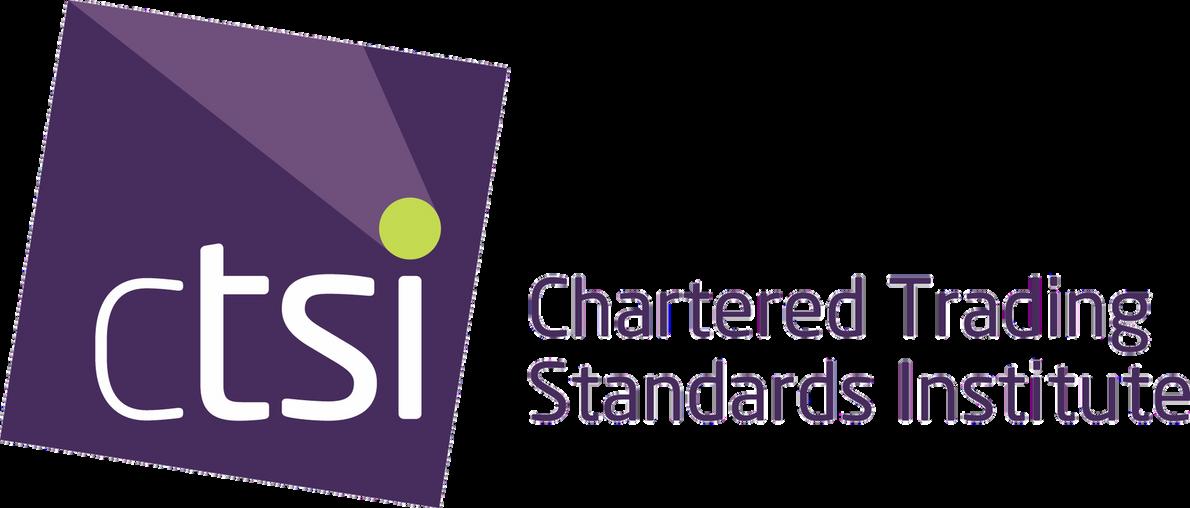


www.tradingstandards.uk/consumercodes
Almost 80,000 businesses are now part of CCAS
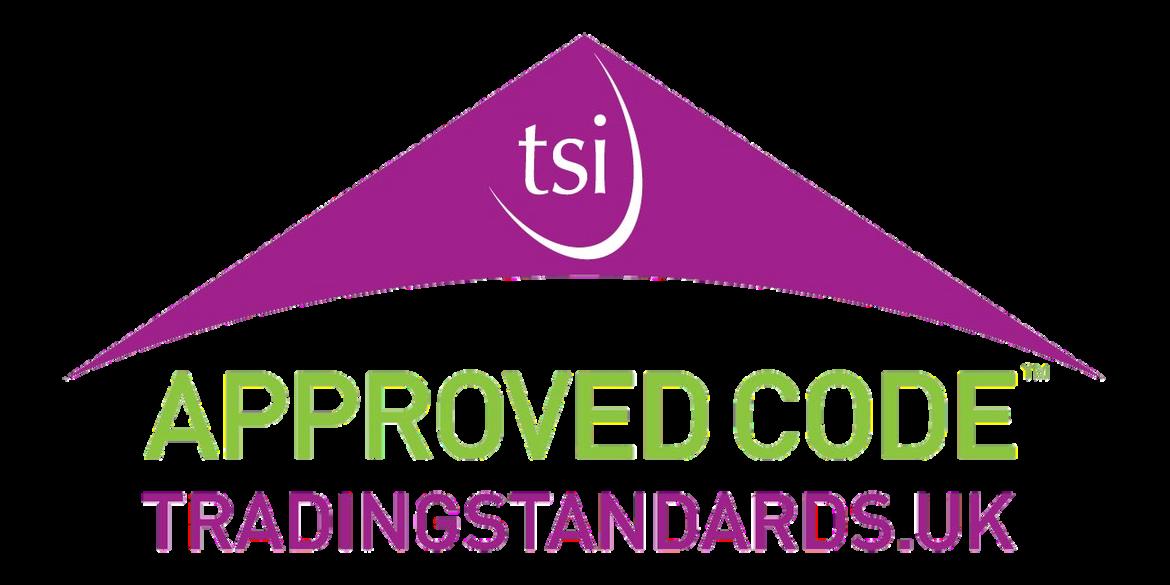




















KEEP YOUR BUSINESS AT ITS PEAK Detailed Information Concise Guidance The Basics In-depth detailed guides What, where and how you sell Need-to-know on trading law use our free legal advice to stay on top www.businesscompanion.info Business in Focus Holiday parks Make sure your business complies with consumer law Guidance for holiday park owners and operators selling holiday caravans / holiday lodges for private ownership This guide was produced as part of business advice project by the Department for Business, Energy and Industrial Strategy and the Chartered Trading Standards Institute. Business in Focus Starting an online business Make sure your business complies with consumer law Guidance for online sellers This guide was produced as part of business advice project by the Department for Business, Energy and Industrial Strategy and the Chartered Business in Focus Selling goods via online platforms Make sure your business complies with consumer law Guidance for traders This guide was produced as part of a business advice project by the Department for Business, Energy and Industrial Strategy and the Chartered Business in Focus Providing safe products for the UK marketplace Make sure your business complies with consumer law Guidance for businesses on PAS 7050: Bringing safe products to the market. Code of practice This guide was produced as part business advice project by the Department for Business, Energy and Industrial Strategy and the Chartered Trading Standards Institute. GET THE LATEST GUIDES NOW AT

















































































































































































































































































































































